#I just don’t understand why almost every abuse victim becomes a villain?
Note
I saw that post and I'm not ignoring the fact that they have shitty home lives, believe me, I understand where they're coming from and I wished I could've helped them if they were IRL. It's just that they did things that I can't excuse them for and that's why I'm angry at them. Though my anger for Cherubim had waned over the years but still.
oh yeah I totally get that! what they did was totally inexcusable! ( even though what Adam did has been really inconsistent in canon? mothy loves to retcon phew ... ) no one should be excusing or defending Kai’s racism or Kaspar’s cheating ( trust me, cheating / affairs are a HUGE trigger for me ) and definitely Duke Venomania’s actions ( but we all know I have a lot to say about that ).
honestly if I see ppl genuinely defending those actions... I’m gonna be... pretty unnerved...
I just think it’s not okay how both mothy and a HUGE portion of the fandom treats them when it comes to the abuse they’ve faced. I’ll be very honest, the evillious fandom is... generally very, VERY problematic... I always love to have the most hope in people, but I constantly see such awful behavior towards these characters, as well as real life people ( I know that all too well. ) and it grows tiring to see such saddening behavior over and over again from the top creators in the fandom :( but... I digress
regardless, it’s absolutely acceptable and GOOD to be angry with the actions of these characters... I just think you shouldn’t brush off the abuse and manipulation they’ve faced that have led to their actions.
#evillious chronicles#abuse tw#mothy really hates abuse victims and it shows /hj#I just don’t understand why almost every abuse victim becomes a villain?#that’s... not good and pushes on real life stereotypes#especially in Cherubim and Kai’s cases 😭
4 notes
·
View notes
Photo
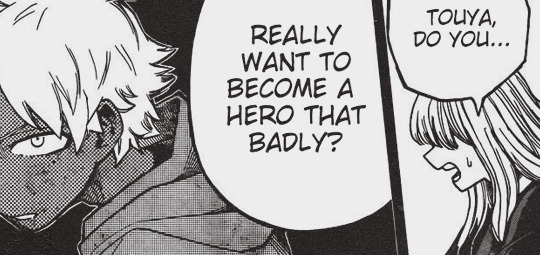

The Todorokis and the Shimuras...
The Shimura family is the set up for how we are supposed to judge the Todorokis. They were the original broken house that fell apart. Everything in Shigaraki’s flashback, informs Dabi’s flashback later. We see the same abusive dynamics repeating again and again, and yet nobody learning from them. @logicalbookthief wrote almost a week ago and it turned out to be near clairyvoyant to this weak’s chapter.
Interesting that Dabi, Shigaraki and Toga all internalized the idea they’re “bad” or “not good (enough)” as children. Interesting how rather than discouraging this idea, the adults around them reinforce that they don’t deserve the care a “good” or “perfect” child would be entitled to, by seeing their pain and doing nothing to help.
Shigaraki and Dabi are established as foils precisely because, they ar both children who, literally no matter what in their household, kept trying to be good heroes. However, every adult around them treated them like they were the problem, that they were at fault for what went wrong in the household, no matter how hard they struggled to be good they were labeled as “bad children.” They’re the scapegoats of their household, and as they grow into adults they become the scapegoats of society. “Do you really want to be a hero?” is asked to both Shigaraki and Dabi, they can’t be seen as good
Because it’s easier to divide between good children and bad children, good victims and bad victims, then for the adults to actually try to fix their mistakes. That would mean admitting that they might be the problem too. In order to enforce this, they even lift up other children as “good children” creating golden childs, and because they didn’t react as strongly to the abuse then it puts Tenko and Toya as the ones to blame for not trying to be good enough. It’s Toya’s fault he became a villain, unlike Shoto who tried to be the hero of his family despite all of his abuse. Toya must have never really wanted to be a hero in the first place.
1. Tenko and Toya were good boys
If Tenko and Toya were not forced to carry the blame for how their household went wrong. If one actually looked at them as children, it’s easy to notice what good children they were, actually.
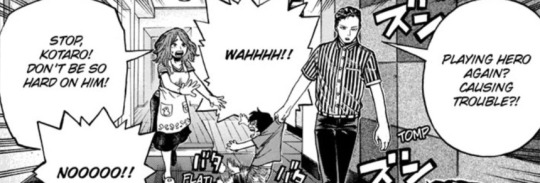
When Kotaro punishes Tenko for playing hero again he assumes he was just not listening to his rule, and trying to cause trouble. However, when Nao asks him why he was doing it, we learn his motivation, Tenko didn’t want two bullied kids to be left out.
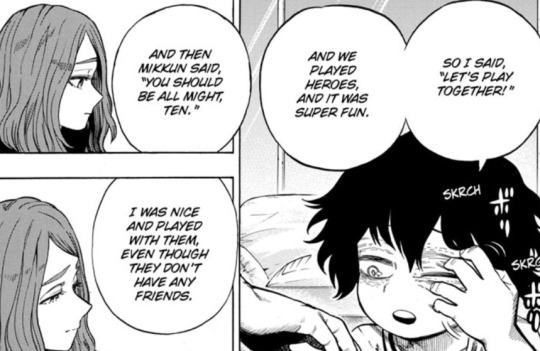
Tenko is five, so he doesn’t really have like a developed personality yet, but a lot of the positive qualities Shigaraki displays as an adult are all their.
Tenko always follows his own dream, no matter how much the adults around him try to discourage him. His desire to be a hero is that strong. He has the same quality that Deku is constantly praised for.
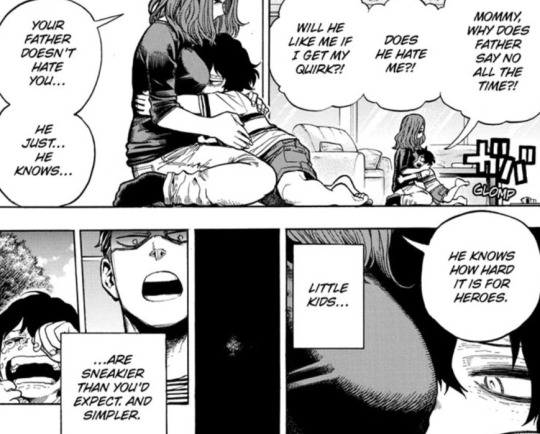
Tenko is also, extremely emotionally intelligent. He realizes that his father is the one in the wrong for always picking on him, and that his parents are siding with his father and not him by reassuring him of his father’s good intentions. Your father has a reason for always forbidding you to be a hero. Your father means well. Everyone puts, Kotaro’s good intentions, and Kotaro’s well being over Tenko’s. It’s Tenko’s fault for provoking him, it’s Tenkos’s fault for not giving up on his dream of being a hero.
It’s interesting how Tenko and Toya almost come from seemingly opposite households. Tenko comes from a friendly household where he has an extremely close relationship with his sister, where his grandparents are almost always comforting him and doing fun things with him, and yet he still feels smothered by it all because nobody wants to tell Kotaro off, so his emotional needs are neglected. Tenko spends a lot of his time with his family, Toya spends time mostly isolated from his mother and father and yet, they both feel rejected fundamentally from the household dynamic.
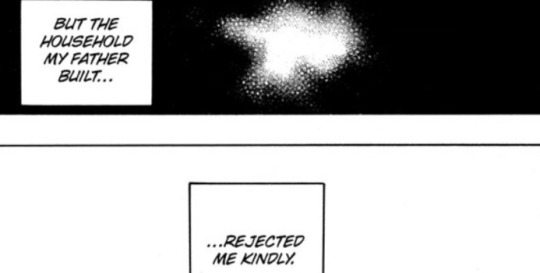
It’s because no matter what at the end of the day they are the scapgoat for their household, it doesn’t matter what Tenko and Toya’s actual emotions and intentions are, because they’re perceived as thebad ones. We as the audience see Tenko’s sensitivity, his care for others, his desire to be a hero, but his family labels him as a troublemaker for... having the same dream every other five year old kid his age as. Tenko and Toya aren’t really allowed to make mistakes, or be wrong about things like normal kisd would because they’re not really normal kids, they’re “the problem child” or the “problem” of the household.
It’s not just that Tenko was abused, it was that he was abused in front of everybody, and not a single person tried to help.
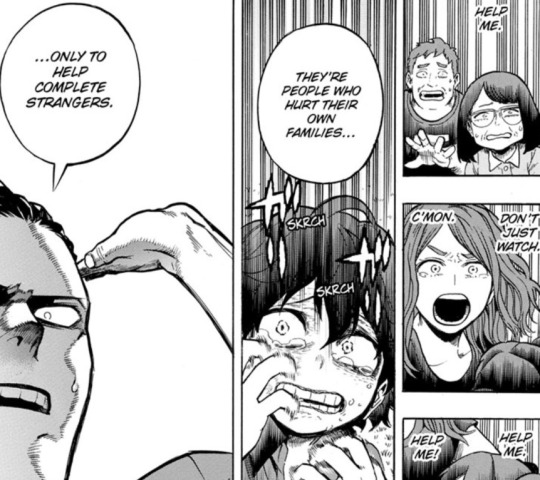
He could have stopped if anybody in his family did anything but watch, but in that moment they didn’t. Of course it’s hard to stand up to an abuser, that’s only human, but not only did they leave Tenko to cry alone afterwards, they also created the atmosphere where Kotaro was constantly apologized for, and Tenko was constnatly blamed, which eventually led up to this.
Tenko is not a bad child, Tenko is five. The story repeats for Toya, I don’t think the adults around him realized what an amazing child Toya was.

He’s just as hard working as any other kid at UA. Isn’t that the motto? Plus Ultra? Always put the effort in and be willing to break yourself to be the best. That’s what Bakugo is taught, that’s what Shoto is taught later on. They always have to be willing to push themselves to their limits and surpass it.
Yet, for doing what any other kid did, Toya is punished. It’s not his father’s fault, it’s Toya’s, because Toya just can’t give up. Literally nevermind his fact that Enji taught him to think this way, that literally every other kid his age is taught to push themselves to be a hero, no it’s just something wrong with Toya. Toya’s the one who won’t give up, and there’s nothing Enji can do to make him give up.

Let’s ignore the fact that Enji is also. you know, a liar.
Having more kids to replace Toya isn’t for Toya’s sake, it’s for the sake of Enji’s dream. Enji doesn’t do what’s best for Toya’s welll being like ever, he gives up on Toya because Toya won’t surpass all might so it’s pointless, he continues making kids until he gets one with the quirk he wants, because, that’s what his goal is. Enji’s goal was never to have a family or be a father, it was to get an heir with an ideal quirk.

Yet, Enji is given the benefit of the doubt that he’s doing this for Toya’s sake, and Toya isn’t. Toya is just the proble child causing disruption in the household. It’s Toya who won’t give up on the training.
Except once again, by seeing Toya as the bad child they’re missing out on what a good child Toya is. Look how hard he tries, look how he doesn’t give up, even when everyone around him tells him his dream is impossible he keeps on struggling agaist impossible odds. Is it wrong for a disabled person to want to run a marathon? Is it wrong for a person in a wheelchair to want to play basketball? Yes, Toya’s quirk may have gotten in the way of him being a hero, but there were ways Enji could have accomodated his disability, supervised him, taught him how to become a hero without hurting himself.
Except, Enji was never ever interested in any of those things. Enji didn’t care about Toya’s dream. Enji didn’t even care about Toya besides the fact that Toya could be made to carry his own dream.

Toya’s extremely hardworking, dedicated, and also intelligent as well. When he was a kid he was capable of comprehending that it was wrong of him to attack Shoto. He realized that in the household he was being abused. A thirteen year old was even capable of understanding that Enji SHOULDN’T be able to get away with what he’s doing.
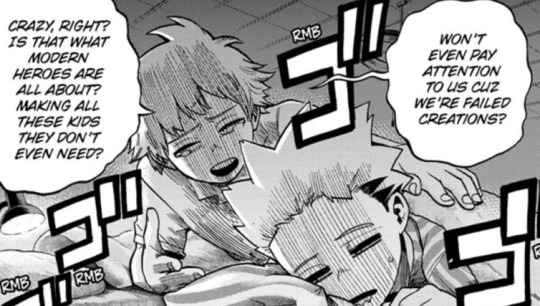
Like everyone goes on and on about what Toya says about his sister and his mother this chapter, but no one mentioned the fact that Toya was right. Toya had the correct political take. An abuser should not be allowed to keep his job as a hero like this if he’s going to treat his family this way. Just like a hollywood producer who abuses women shouldn’t be allowed to keep their job if they’re using it to take advantage of others.
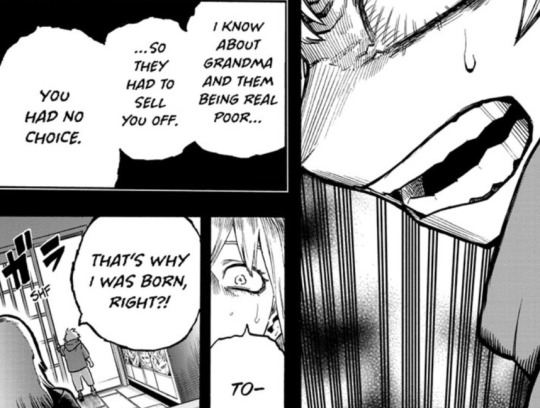
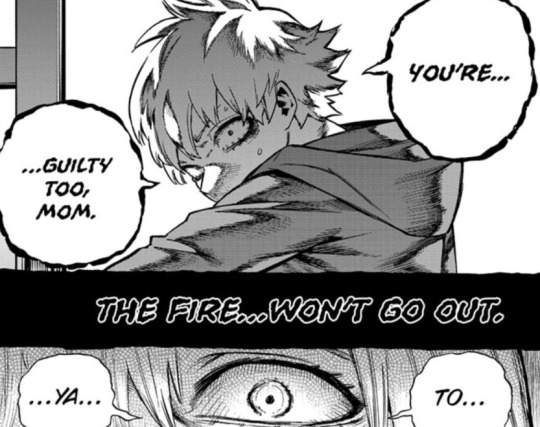
Toya confronts his mother for the fact that she’s failing him as a parent as well. That’s not Toya being misogynist towards Rei, he’s telling her the truth and holding her accountable. Yes, Rei is also a victim, but Toya is thirteen he doesn’t understand that. All he understands is that he’s being neglected by both parents. I mean, look at how Rei sees Toya. Look at how the scene is framed visually. This is Rei’s flashback of Toya it seems like.
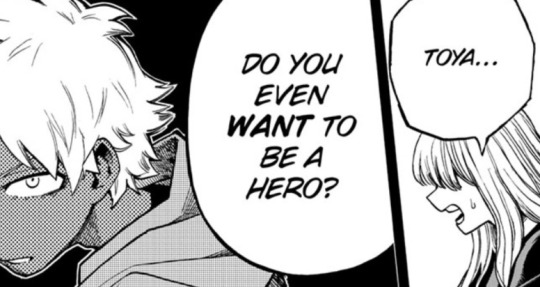
She paints him like an incrediblly disturbed child.
As if Toya is the disturbance in the household. As if he’s the bad one.
As if he’s the one causing the problem.
As if, if he just gave up his dream of being a hero then everything would be better.
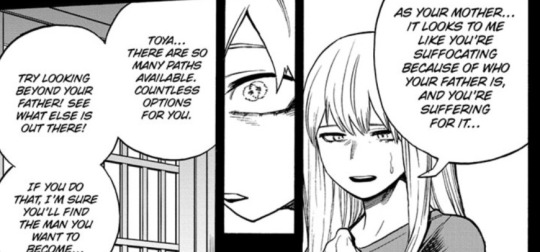
Ignoring the fact that, Toya would still be an abused child even if he didn’t react the way he did. If Toya was quiet. If Toya shut up. He’d still have grown up with zero parenting at all. Enji still would have gone on to abuse Shoto. Look at Toya’s reaction in his eyes. Look at the way his pupils shake. He’s being told that if he just gave up his dream of being a hero, the household will be happier, but he knows that’s not true. Toya knows the problem in the household is Enji. If Toya gave up his dream of being a hero, he’d still be a deeply unhappy individual, he’d just be suffering more quietly. The household would still be an abusive one. Toya in the end, still won’t be parented properly, because, Rei and Enji don’t see Toya as a kid.

Literally all Enji had to do was lift up a finger. All he had to do was walk up to the mountain and talk to him, and he couldn’t even be bothered to do that. Toya was trying so hard to be good, to meet his parents standards, and yet he never would because his parents standards were impossible to meet in the first place.
“Well, gosh I didn’t know what to say to him it would have been hard.”
Yeah, I bet it was hard when he LITERALLY BURNED ALIVE.
It’s not just the one incident of this though. Enji and Rei both frame it as an oopsie daisy. If only he had been stopped on that one day. And not like, the five continuous years of ignoring him that built up before that point. The fact that he was never really taught how to handle his emotions in a healthy way, because neither of his parents treated him as a child.

However, the narrative of the scapeogat and the good child still remains. Despite the fact that Toya and Tenko were children trying so hard to be good, and all they needed was someone to tell them that.
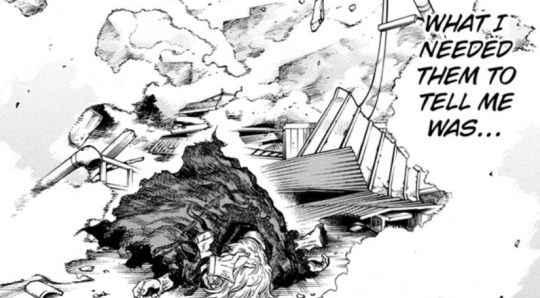

When all they wanted was for people to see the good in their own actions, to see how much they were trying, struggling, to be good, because they are the scapegoat they will always be the villain of the family.
I think it’s amazing that Toya is trying to be good even now. Toya, unlike Enji who only ever cared about the number one spot, is interested in creating a world where heroes are actually taken to task and treated as heroes. Shigaraki cares about people who were similiarly rejected to him, and offers them a helping hand.
Shigaraki and Dabi are capable of so much good. They still care about the world. They’re still trying to create a world better to others than it was to them. Shigaraki’s goal even shifts from empty destruction, to just, I want to give a world to my allies where they can be free.

Instead of seeing them as victims, they divide victims into good and bad. Shoto is the hero of the family because look how good he turned out even though he went through the same thing Dabi did.

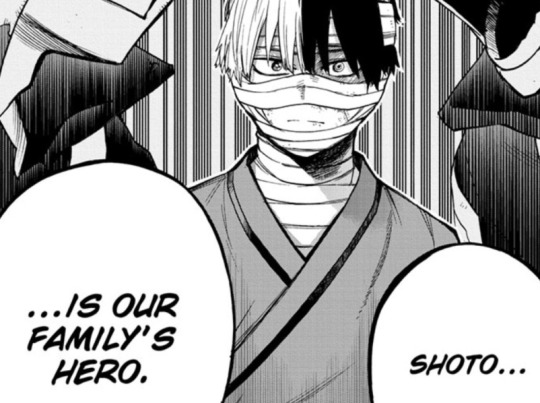
Is Rei wrong for focusing first on stopping Dabi rom hurting innocent people rather than focusing on getting him the help he needs.
Well, you think Rei would know.
That people who come from abusive households. People who are constantly abused. Can lash out and abuse completely innocent people. I’t almost like that’s exactly what she did to Shoto, blaming him and burning him instead for what Enji did.
And it’s almost like Rei didn’t start to improve until she received outside medical help.
Heroes pretend to protect society, while turning a blind eye to those who they can’t save, who are most in need of their help. They blame bad victims, and uplift good victims to use an example against the bad victims, well why couldn’t Toya have turned out a good child like Shoto.
Man.
It’s almost like.
Shoto didn’t burn to death.
Because Enji couldn’t be bothered to walk up to a mountain.
It’s like letting a child starve to death and then saying “Well, why didn’t this child learn how to cook?”
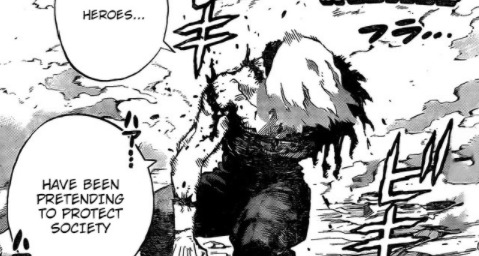
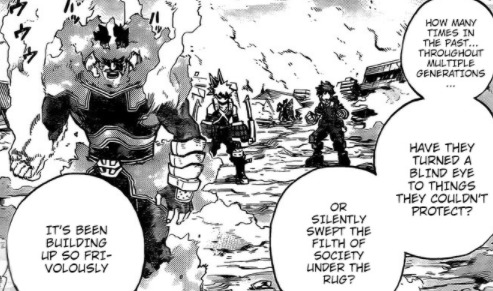
They divide the good and the bad and throw the bad out. Well, isn’t it a tragedy that Toya became Dabi. Isn’t it just a tragedy that that child couldn’t be saved. It’s not the five years of neglect, it’s the one day on the mountain that was the turning point for that.
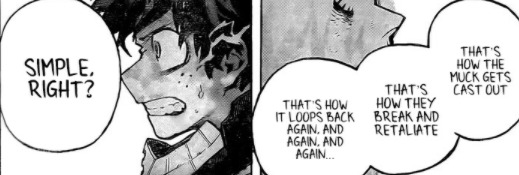
It looks like on the surface that Toya’s family is admitting what went wrong, but they’re really kind of not. Toya doesn’t need to be fought as a villain. Toya doesn’t ned to be stopped. Labeling bad victims as villains and putting them down with violence literally never helps, because that’s thementality that created them in the first place. It was Toya’s behavior that needed to be stopped, he was the thing in the Todoroki household, that made everything else go wrong. If only Toya had not died, then Enji wouldn’t have abused Shoto so hard EXCEPT WE ALREADY KNOW THAT WAS ENJI’S INTENTIONS ALL ALONG FROM THE START. If Toya had lived Enji would have kept on doing whatever he wanted with Shoto, because no one in that house was going to hold him accountable.
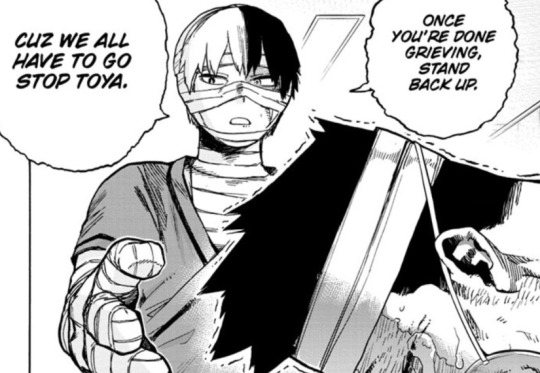
Even now, Enji gets the unconditional support that Toya deserved as a child, that he needs now, just because he happens to be a hero. Certain people are labeled as heroes, certain people are labeled as villain. Good victims are saved and given the support they need, bad victims are violently put down.
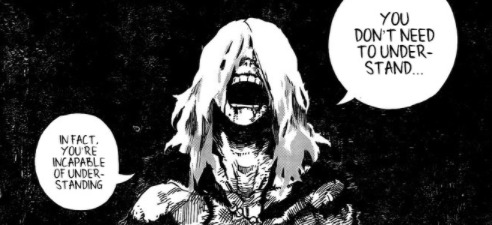

Even Natsuo says this, that he should have just told Toya to stop complaining about the family.

But aren’t the things the villains saying you know right? That Enji should not be allowed to keep his job. That Enji abused his whole family. Wht would have been different if Natsuo and Toya had their talks? Toya would still be a severely abused child who carried that abuse into adulthood, but he wouldn’t be making a fuss about it? He wouldn’t be loud about it?
It’s suppression over recognizing the victim’s pain. It’s blaming the victims without looking at the cause. The Todoroki family set up Shoto as the hero responsible for saving the whole family because he is the good victim, and as a indirectly, they imply that Toya is the villain in need of stopping.
Once again I return to both the Todorokis and the Tenkos. By refusing to see the good in their children, to see that Tenko and Toya were just children who wanted and tred their best to be heroes and were unfairly punished for it, they ultimately suffocate both children. By labeling them as deviants who need to be stopped rather than victims who they abused, they just, keep suffocating them.
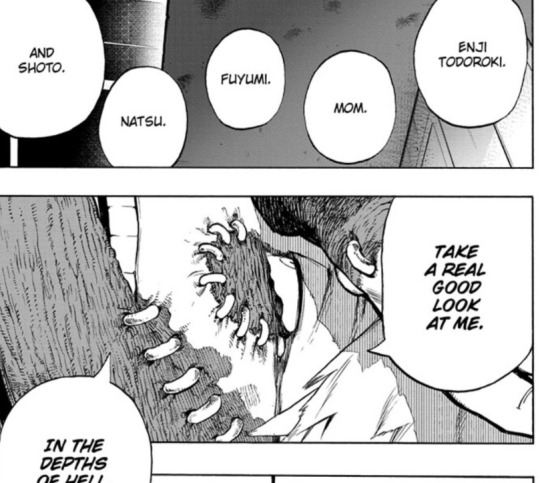
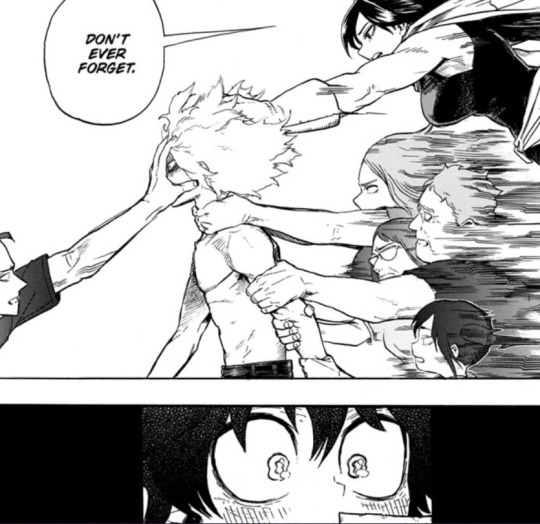
Which is why no matter how much Toya or Tenko may love their families, no matter how much they may sympathize and love their mothers, they still feel denied, suffocated by the whole family. Because their whole family fails to see their good intentions, fails to see who they are as children. They can’t see how much they genuinely wanted to be a hero, and they can’t see how much they were suffering as well, because they’re not good children they’ve alraedy been labeled as bad ones.
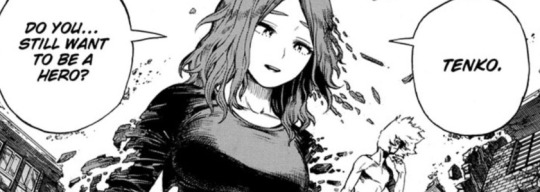
That’s why they ask over and voer again, do you still want to be a hero?
When all they needed to be told was it was possible for them to be a hero. When that was all they needed to hear, they were rejected instead. That’s why they can’t go back either, because they know after all this time their family still doesn’t understand. They’ll be rejected all over again.
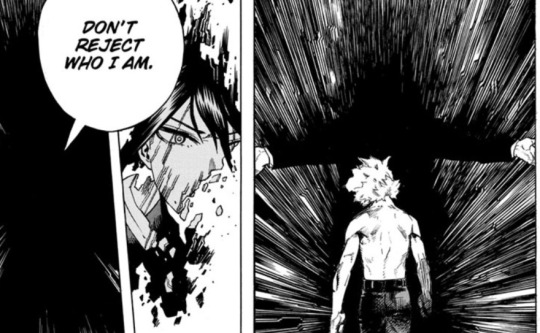
And the scapegoat will remain a scapegoat forever.
#mha meta#shigaraki tomura#shimura tenko#todoroki toya#dabi#todoroki family#shimura family#todoroki#shimura#bnha 302#bnha spoilers#bnha 302 spoilers
1K notes
·
View notes
Text
MY THOUGHTS ON TITANS’ RED HOOD,
BEFORE WATCHING THE LAST EPISODE.
I will start by saying that I haven’t been able to watch the show, these are my thoughts after reading a very well-written and detailed review of the last episode. The review is also written by someone that enjoys the show, this is important because my thoughts don’t align with theirs.
I understand that Titans is known for being garbage, I know their writing is messed up, and I had no hope whatsoever for them to actually write a good Jason Todd/Red Hood story. I would also like to make clear that this post is in no way hate towards the actor playing Jason, this post is just my thoughts on Jason’s characterization.
What I really don’t like is these shows/movies taking the names of loved characters and making an “original character” out of them. Yes, there are different takes of the character and you can build their story differently but I do feel that what they did with Jason is beyond all that. They twisted every concept from his origin and his story, nothing really fits, but someway, somehow, they still managed to push all the wrong narratives when it comes to Robin Jason.
Two of the most horrible narratives that DC has decided to push are “Robin Jason was reckless and a troubled kid that never did what he was told” and “Jason Todd is to blame for his death”.
The show does push the one where Jason is reckless. Jason is consumed by fear, and Bruce Wayne pays attention to that but he doesn’t only do that, he also offers comfort and help, he tries to make Robin Jason go to therapy.
This is huge, they build up the perfect scenario for Jason to not become the Red Hood. But for some reason, they decided to make Jason reckless and too eager to prove that he didn’t need that kind of help. And then they didn’t help Jason’s case because they wrote their Bruce as a caring father that does not want to see his son get hurt or end up dead.
This Bruce Wayne is doing everything that comics Bruce Wayne didn’t. This Bruce cares, so once more, one would think that this Jason wouldn’t become the Red Hood. But, surprise! Jason Todd doesn’t take well the news of him not being able to be Robin anymore.
Here is the thing, if you were Bruce in this situation, would you let this Jason continue to be Robin when he is a danger to himself? I know I wouldn’t.
Here is where Titans’ terrible writing reaches its peak. They have a vulnerable and reckless Jason try to prove that he can still be Robin by working on *something* that can take his fears away. Jason Todd wants to make a drug, let that one sink in.
Jason Todd wants to make something that is basically a drug. Did Titans really erase the fact that Jason’s mother overdosed? Because that’s one of the most important things in Jason’s life and that built up his hate for drugs and what they do to people. His mother was in an abusive relationship and that led her to do drugs and later led her to her own death.
This might not sound too important to other people but to me, it’s something that has always been important to Jason’s character before and after his death.
Going back to the actual show, Jason goes to Scarecrow, willingly, and asks him to make him a drug that will make him don’t feel fear. I know that this Jason is vulnerable and that he probably thinks that therapy isn’t working for him, but why on earth would Jason think that making Scarecrow make a drug for him would be a good idea?
How does that make sense? The show is basically telling us that Jason had a support system and that he was going to therapy because Bruce wouldn’t want to lose his SON. Why does this show go far and beyond to make Jason look reckless and dumb?
This is not me comparing Comics Jason to Titans Jason anymore, this is me finding Titans’ logic unnecessarily stupid, they really went out of their way to write pure stupidity.
Why would they write Bruce as a caring father and as actively working so Jason can be in a better mental state so he won’t lose him as his son if they are also going to write Jason as an incredibly reckless man? Are we supposed to be on Bruce’s side? Because as of now, Bruce is the only one with brain cells.
There is absolutely no way to compare that to comics because in comics Bruce neglected Jason’s needs and refused to see that Jason had different morals even back then, and that neglect was key in Jason jumping onto the idea that he needed someone that he could call family and actually care for him. He wanted love and attention from a parental figure because he didn’t feel like he had one. Robin wasn’t everything that Jason was, he was also a kid with normal needs.
So, you build that completely different and actually give Jason the support that he also wanted in the show but for some reason, he is fiercely attached to Robin even though his fear comes from the fact that he almost died for being Robin. There is no logic to this Jason’s actions and that isn’t on Jason it's on the writers’ incredibly garbage writing. It is like they come up with ten different ideas and they put all of them but none of them are actually solid and well-developed concepts.
And you can’t tell me to get over it because “Titans has always had bad writing, there were two seasons of bad writing”. Listen, if you are happy to consume media that is badly written then that’s on you, Jason is one of my favorite characters, I don’t want him to be written badly just because that’s the show’s style. And there is absolutely nothing wrong with me wanting writers to actually care about the characters they are writing for, all three seasons have had different writers, is it really so far-fetched for me to want one of these people to write something that makes sense?
Jason's death was tragic in both comics and the show, and he was a victim in both of them, yes. But the show really pushes the limits of that, Jason wanted to take something to make him not fear, he looked for Scarecrow (not Dr. Jonathan Crane, Scarecrow, and he was an already established villain) to make him this drug when he couldn’t make it himself. He trusted Scarecrow (for some weird reason) and then as a test he went to fight Joker? It’s tragic because it ended with Jason dying but it's also tragic because the writing is just bad. It just is, and that is a problem for me.
From then on, we have the “big connection” to comics, the Lazarus Pit! Wow, you guys did it, yeah, everyone loves the Lazarus Pit, every time I think about Jason, I only think about that one time in which he was thrown in a Lazarus Pit to recover his mental injuries or all of his injuries after he came back from the dead.
This Jason has no training, there is no Talia, no League of Assassins, no Ducra or All-Castle, there is only Scarecrow and his new puppet, the Red Hood.
It changes everything and I don’t like it. Once again, I understand and know the concept of the multiverse, the various earths, and the Elseworlds, but that doesn’t mean that I have to like this take on Jason Todd/Red Hood along with its horrendous writing.
I don’t have to like it, just like I understand that others do like it because it is their first contact with the character or because they are fine, as fans of the character, with a new take. I am not gatekeeping Jason Todd or Red Hood; I am just saying that my being angry at this version and absolutely hating it is just as valid as liking this version of Jason.
Red Hood in Titans is just Scarecrow’s puppet, that’s how things are, and I just think that it is too big of a change from the original reasons for Jason to become Red Hood. And I will never get tired of saying this, Red Hood wasn’t only all about the Joker killing him and Batman not killing the Joker. The Red Hood was Jason’s way to make things work, to prove to Bruce that Batman wasn’t enough for Gotham. Red Hood came back to Gotham to stop bad people from introducing children to drugs and to make Gotham’s people feel safe.
He thought that Red Hood was the better version of Batman for Gotham and its people.
But I am not blind, I can see how Titans can twist it again to give us Red Hood as a protector of children and Gotham in general. I can see the “I used to do drugs and now I will fight so no other person goes through the same”, I see it and I am aware of it but it does also bring me to my other problem with Titans and DC in general: story swapping.
Story Swapping is something that DC loves to do, they thrive when they make change people’s origins for others and when they take character traits from one character to another.
And Titans’ Jason Todd is just that, he has characteristics and plot concepts from Dick Grayson and if what I just predicted happens then he will have some of Roy Harper's characteristics. And that is exactly what Lobdell did, but somehow, they managed to get different results. I cannot praise Titans for giving us a new Red Hood origin because they made his characterization with the help of other character’s origins and/or stories.
This is the first time that we see a live-action Jason Todd/Red Hood, was it really that hard to just stick to his origins as both Robin and Red Hood? There is so much to explore from Jason, there is so much between his death and him becoming Red Hood, from both before and after New 52.
Jason becoming Red Hood under the influence of Scarecrow in moths is lazy, bland and an insult to Jason’s character. They could have done things by the book and then explore things that we have never seen before in a show or movie.
Jason has had so much training outside of Gotham, why did Titans think that they could do acceptable work at bringing this amazingly complex character in a show that has nothing to do with him.
They could have had him killed in the Titans show and then wait and make a Red Hood show to actually tell a good story. What is Jason Todd doing in a show that is called Titans? Where are the Titans? They chose the most recognizable Titans’ line-up and they are not using it. They butchered Garth and Donna and for what?
DC gets away way too much with selling their stupid shows and movies by telling us that x character will appear but then when you watch the thing for that x character, they are nowhere to be seen. That’s exactly what they did with Cassandra Cain and what they are doing with Red Hood.
I don’t know how this tv show is doing, I only know that as a non-American that pays the same money for an HBO Max subscription, I don’t get to see any Titans content, not even a miserable trailer.
But I know that if non-comic readers are watching it, they will love it and if they actually were to start reading comics because of the show, then they wouldn’t find that Jason there. So, either that leads to Jason’s characterization being messed up even more within comics or it does nothing for Jason or comics.
To end this post, I just want to bring up the animated movie Batman: Under the Red Hood (2010).
That movie was widely praised and loved by critics, comic readers, and non-comic readers. It was fantastic, the story was amazing (even though it had differences with the comic, one might say that the differences improved the story), the voice acting was phenomenal, everything was done beautifully. Do you know what made it that way? The writing.
And you know who wrote the animated movie? The same person who wrote the comic the movie is based on, Judd Winick.
With that I am not saying that Titans should have had Judd write for them, what I am saying is that given the fact that they are using a pre-existing character they should chat with the Red Hood’s creator or even the writer that wrote for him for ten years after the character came back to comics.
This show obviously didn’t do that though, they preferred to write Jason Todd/Red Hood as if he were a Titans original character, but the thing is, from where I see it Titans didn’t give us an OC, they gave us an OOC.
-
So, to sum it all up, I hate Titans’ version of Jason Todd/Red Hood, I think that it is not only badly written but there is also no real logic to what they are trying to do so far. I am also tired of their bad and lazy writing in general. And I would have liked the Titans’ writers to actually respect the Red Hood lore because if they had I would have actually been excited about a Red Hood spin-off show.
Using the material that is available to you isn’t a crime, building from that material is the best thing that they could have done, but all they really wanted to do was use Red Hood’s name to get more money from a dying show.
It makes the show look cheap and actually not interested in giving us good stories, and no, I wasn’t expecting Captain America: The Winter Soldier levels of good writing or good changes to a very loved story/characters, I was actually expecting some Lobdell writing level and the way I see it we ended up getting something worse.
These are all my opinions. You can like, love, or dislike this version of Jason and the show as much as you want but you won’t find any form of love towards the show in this blog, at least not right now.
-
MY THOUGHTS ON TITANS’ RED HOOD,
AFTER WATCHING THE LAST EPISODE.
Well, I will start this part by saying: Sorry. I am sorry that I believed that Titans’ Red Hood was bad, it is actually worse than bad.
I was so wrong on many things, that review really made me think that things weren’t that bad but I still hated what I read. Now that I have watched the episode because I wanted this post to be extra honest and to stop myself from saying stupid stuff, I can also say that I hated what I watched.
This show really validates the two most horrible narratives that DC has been pushing for Jason: “he was a reckless Robin that didn’t think about his actions” and “he was to blame for his own death”
Jason Todd wasn’t a victim of Scarecrow, this Jason Todd took every single bad decision that he could, and those decisions led him to his death. No sympathy for this man.
Also, this Jason is like 19? He doesn’t look younger than that, but that’s not the point, what I am trying to point out is that this Robin is extremely underprepared, he lacks training and the mental capacity to stop acting like an edge lord every time he opens his mouth. He is annoying.
And I was wrong about Titans erasing the plotline of Jason’s mother dying of an overdose, she did die that way and this Jason spoke of her as if he hated her. What is going on? This Jason really doesn’t make me feel an ounce of sympathy for him. This attitude of “no one understands my pain” when everybody is trying to help you doesn’t make you look cool or anything of the sort, it makes you look annoying.
It is even worse because this Jason is so immature and reckless that he made his friend Molly (that is just a normal teen with no training) go after a thug with him, while he was not mentally well. He made that decision for them and put himself and her in danger. If that scene had gone any other way, then Jason could have been guilty of getting his friend injured or killed.
Jason Todd is so incredibly dumb; he is not a child but he acts like one every step of the way.
Nothing makes sense in his whole ass interaction with Bruce in front of the theatre, it’s like Jason refuses to listen to what Bruce tells him, well not that he refuses to listen it is more like a “Telefono descompuesto” I don’t know if you guys have that game but you basically have to tell something in someone’s ear and then the person repeats what they understood to the next and so on, what you said is heavily distorted by the end of the game. In this scene that is exactly what happens but it’s between two people.
When Jason accuses Bruce of not taking away Robin from Dick, Bruce says something along the lines of “I learned from my mistakes” and Jason says “so, I am a mistake now?”. Jason, use your ears, if Bruce says that he learned from his mistakes when talking about Dick, then his mistake was what he did with Dick. The writing is so bad, it's actually painful and it is even worse because the acting is bad, but I can’t blame the actors, it must really be hard to make a scene work when the writing is that bad. (Also, the unnecessary pauses, and the sounds that they play after they say something stupid, it is too funny).
Do you know what made me cringe? When they were having the chat in the theatre, in my mind all I could hear was “if you are nothing without the suit then you shouldn’t have it”, not me quoting Tony Stark in my head! I haven’t even watched that movie! But it fits perfectly for that scene.
The interaction with Scarecrow was more than dumb, if Jason was already acting like a child, now, he is basically acting like a toddler. Scarecrow saw right through him in seconds and just as fast decided that he was going to have fun with his new toy. He gave him a formula that wasn’t quite correct even though it looked like he knew exactly how to make the reverse version of his fear gas. This Jason has zero detective or survival skills but we already knew that when he made himself get captured and tortured by Deathstroke.
Anyway, all the interactions with Scarecrow were allowed to happen because this Jason can’t put two and two together. He convinces himself that everyone is out to get him, dude, Bruce is a detective and he also has eyes, Leslie didn’t tell him anything. If I were Bruce, you wouldn’t be able to be Robin anymore either.
I understand that Jason is not in a good mental place and that he wants to make his fears go away, but he had support, people around him were trying to get him help, trying to make him understand that he was hurting himself. His over-the-top anger and recklessness are unjustified when you refuse to take the help that is being offered to you.
He made terrible decisions for selfish purposes and that got him killed.
This is one of the last things I want to say, Scarecrow either didn’t need Jason at all to get out of Arkham or the writers made an oopsie because at the end of the episode he had someone helping him put Jason in the Lazarus Pit and then he was out of Arkham and he had a suit ready for Jason and everything. How did he manage all that? No idea.
The Lazarus Pit, yeah, I am sorry to be that person but the Pit can’t bring back people from the dead, it can only restore or heal physical and mental injuries (however grave they were), but Lobdell messed that one up already and Titans really didn’t have time to write a single good scene so what was I expecting?
Anyway, the last thing I wanted to say is that I know why Jason or Red Hood seems to not be affected by the drug when he sees Molly at the end of the episode, it is because the executive producer of the show is Geoff Johns! He loves making Jason fall for girls and get all mushy and dumb, do you guys remember how dumb he got when he left with Rose?
Jason being written as the kind of guy that acts like a love-sick puppy with a girl but also screams at her when he gets mad is peak Geoff Johns. So, if you were wondering where that came from, well, there it is.
Yeah, that is all I had to say, honestly if you have read this whole post then you are one strong individual, I am sorry I put you through all my thinking and rambling. You didn’t really deserve that.
I didn’t want to delete the first part of the post because I talked about so much more than the show and my thoughts before watching the episode still stand. I hope this post isn’t too confusing. As always you can think the complete opposite of me about the show or anything, I am just writing my thoughts.
Having said all that, I hope all of you, Titans’ lovers, haters, and people that simply do not care, have a wonderful week!
72 notes
·
View notes
Text
I really wanna talk about the parent child relationships in Midnight Mass
I’m not sure if I’m good at writing this sorta Meta but here goes nothing. Very many spoilers follow.
Let’s start with the adults:
First we have Erin who suffered so much at the hands of her mother and later because of her mother’s abuse. We don’t get much detailed info on Peggy Greene but from what we can gather she was a lot like Beverly Keane, who seemed to idolize her (though that probably got easier for her after Peggy was gone), in her self-righteous over-pious manner. She just happened to be Beverly with an alcohol problem and a daughter who she could take all her anger at life for not working out her way for God loving her just the same as everybody else out.
The dove scene is really such a good scene. But Erin was stronger than her mother, stronger than the abuse that was about to repeat itself and when she found out that she would have a child of her own she left and tried her best to give her kid a better life than the one she had. And she found the strength I think with the help of the same God her mother most likely used as legitimation for her abuse (don’t get me wrong I believe it was Erin’s own strength but she also clearly found something in religion that helped her gather it) and it helped her to carve out a path for herself and her unborn child.
Sarah’s relationship to her parents is such an interesting one because we get to see the end of it. The man who she believed to be her father has been dead for a long while and her mother is suffering through the late stages of dementia. And Sarah showed up for it.
As a doctor she most likely knew what would be happening as soon as Mildred started to show the first symptombs but she wasn’t going to leave her mother. That kind of care for an elderly parent shows something that is proven in Mildred’s character time and time again: She is a very devoted parent and the love between mother and daughter flows both ways in every scene they are in together, after the birth of her daughter her world turned around Sarah and she loved her with all she had. There are a few scenes that show that Mildred’s understanding of the duty she felt towards her family came from the old values of her time. She wouldn’t have taken off with John and their child not for a lack of love but because in those times, in catholism still at least where I’m from, you can’t just marry a priest. You can’t just have a child with a priest eventhough you’re married and then fuck off with him. As a woman, as a wife and mother you have to stand with your husband, stand with your child and you have to stop running after fantasies I’m sure Mildred had. I’m saying this all from her perspective btw, I don’t necessarily think running away with John, in the way he wished to, would have been good for Sarah but honesty might have been and her old fashioned values were also what kept her from being truly honest with her daughter.
To John on the other hand Sarah is a fantasy, a dream he couldn’t reach. His daughter, his baby, so close and yet so far away getting to watch her grow into an adult but never being able to really be her father as in her Dad instead of her priest. And it’s painful to him, he clearly loved Mildred, loved Sarah but he was also kinda selfish in his love that in the end took Sarah away.
At first he isolated his child by starring at her giving her the creeps and the feeling that she had done something wrong that he knew she was gay and dissaproved and then he took it upon himself to ‘cure’ Mildred in the same way he was. Sarah wanted to take care of her mother wanted to be there for her in those final months and John decided it was up to him to give Mildred a youth potion to make it so she’d never die. And with that he took away from Sarah what is without doubt a hard but for many people a very important last part of the relationship between child and parent. John was a complicated man and would maybe have been a great Dad he certainly showed a lot of fatherly love for his altar boys but he couldn’t have the family in the way he fantasized about and in the end it was that fantasy that made him act the way he did.
Riley Flynn causes his parents a lot of pain. Him killing that girl in the beginning, his alcoholism, him simply not liking the place, the home they build for themselves through hard work causes the Annie and Ed so much pain and financial loss and you can see how tired they are, how much guilt they feel for failing their son. Ed calls out his own guilt and says that he doesn’t belive it could be Annie’s fault because ‘your mother’s a saint’ but what I truly love about Annie and Ed Flynn is that they both aren’t saints. As a mother Annie is very much overprotective and suffocating, wanting to keep her children on crocket island and hating the notion that they might leave her, even though she is kind and sweet and loving. And while Ed seems rather checked out as a father but he is the more honest parent, never talking down to Riley and telling him as it is, telling him about the pain he caused him while also admitting to the guilt he feels. The Flynns are flawed people even in their religious practice (I think the way Annie speaks about Ali showing up at church when Hassan seemed to be nothing but nice to her spoke very loudly to the fact that Annie is rather misguided sometimes) but they are good people at the core of it and their parenting might have been part of Riley’s way into alcoholism but it wasn’t only them. There were things they couldn’t change and things they had no influence over like his heart being broken by Erin running away, the sort of people he went out on parties with and so many other things...
Yes, they may have shaped their son in a way that made him vulnerable to addiction and the party scene of the stock and tech market and brought him to the point where he killed a child but it doesn’t happen through parenting alone and they also shaped him in the good ways. Him not losing himself when Pruitt changes him, him being brave enough to warn Erin, him standing up for what he believes in those things were also shaped by Ed and Annie. They are one of the best example of flawed but good hearted Christians I have seen in recent media and their portrayal was one of the most heartbreaking ones.
Now the kids:
Let’s start with Leeza. Little Leeza Scarborough who before it comes to her wonder gets treated with pity and overprotectiveness from her parents and the island community at large. Leeza was injured by Joe Collie transforming him into the island’s villain and her into the ever present victim.
What happened to her is without a doubt horrible and I understand why Wade and Dolly started to become these overprotective parents, why they were so easily sucked in to John’s and Bev’s scheme. Their little girl was almost taken from them eventhough Wade is the mayor, one of the most powerful people on the island he had no influence over what happened to Leeza even was the one who took her out that day and what followed the accident was as we can gather from their conversation with Sarah a lot of pain and financial burden though they say they would have done it all over for Leeza. In fact a lot of places in crockett island are wheelchair accesible and I am sure that Wade as mayor made it so (I can’t really imagine that a small place like the island was very inclusive though I may be wrong).
After Leeza is healed they don’t want to question in don’t want to think about what might have been the cause for it. In fact they stop questioning anything after that point, after Leeza walks again they are completely vulnerable to Bev’s manipulation and them letting that happen, them just going along with everything, Wade protecting John after he kills Joe long after Leeza forgave him and with her forgiveness send Joe on a better path is what in the end makes them lose her. Because Leeza isn’t that little victim who needs pity and help, she is a strong minded, strong willed young woman with a lot of wit who similar to Erin finds strength in her faith but in a way that isn’t devotion without question and when the Easter vigil is held she doesn’t follow her parents eventhough she loves them deeply. She forgives them I think, because that’s what Leeza’s character is about in it’s core but her parents were two of the instigators behind what happened on the island, without Wade’s protection John and Bev couldn’t have come as far as they did and they put their trust in them because they loved their daughter so much they didn’t stop to question if maybe what made Leeza walk again was also a bad thing.
Ali and Hassan don’t have it easy and I as a white person really can’t speak much on the racism and religious discrimination they face.
I can say this I think: The first line spoken about Ali before we even really get to look at him is “You didn’t invite Aladin” and already sets us up for what both of them know: They are the outsiders.
Not only because they just moved to the island but also because in their faith they are different from their peers and religion can often be a community building event for people before it is anything else. Ali starts balming his father a little for that, for not trying to fit in more with the community, for moving after his mother’s death and then not trying to be closer to the people around them and for the pain all the pain the two of them went through before Crockett island. It isn’t oly peer pressure though of course that brings Ali to St Patrick’s. Sure, Ali wanted to be part of the community but also desperately wanted to believe that there was a devine power who could if he just did it (it meaning faith) the right way he might find a way to avoid the pain of his parents. Hassan knew that and he warned him that that wasn’t how it worked.
Hassan was a protective Dad and maybe he overdid it from time to time but his worries were never without reason, his need to keep his son safe from a world that hated him for a crime that happened when he wasn’t even born yet never unfounded and him wanting to make sure his kid kept the memory of his mother alive never anything but the wish of a griefing man and loving father.
In the end when they pray together there is peace in them. They face their ends with the dignity Ali’s mother would have wished for and they face it as father and son. While Beverly the true religious terrorist of the story burns away without it.
Warren is the youngest Flynn and it is never directly stated yet omnipresent that his coming of age happens in the shadow of his older brother’s mistake.
Annie warns him away from drinking when he goes out he in fact doesn’t drink. He never drinks because of what his brother did.
Warren would have been 12 when Riley killed that girl and so he would have seen and felt what his brother’s actions did to his parents fully without being yet old enough to maybe see the nuance.
Annie and Ed probably try to right the wrong they believe to have done in parenting Riley with Warren and that’s a lot for a kid. I do think it’s pretty usual that parents of multiple children especially when there’s a larger age gap try to do better with the younger children, but that isn’t fair is it?
Warren is his own person not a second chance to do it over.
And yet seemingly he does what is asked of him. He’s alter boy, he’s charming and helpful and sweet, he doesn’t drink (even when he does smoke pot) and he helps his father where he can with his work.
But in the end he feels guilty because he thinks he wasn’t enough and says at that last dinner he would have been different if he had known he wouldn’t see his family again. But Leeza is right they know and they love him and Warren deserved to not be perfect all the time.
Littlefoot saved Erin and Erin payed her back with all the love she had. She was never born but she gave her mother the strength and willpower to leave.
In her speech to Joe Leeza said he reached through time and took things from her she didn’t even know she had yet.When Erin left her husband she reached through time and saved Littlefoot from a childhood like hers and when John gave Erin the angel’s vampire’s blood he reached through time and took away her child, a child who would have been loved and cared for. A child with an amazing mother and probably a great step-dad.
Littlefoot’s story is tragic because she never got one.
#midnight mass#midnight mass spoilers#parents in midnight mass#I dunno man I just really love how they showed all these examples of parents
72 notes
·
View notes
Text
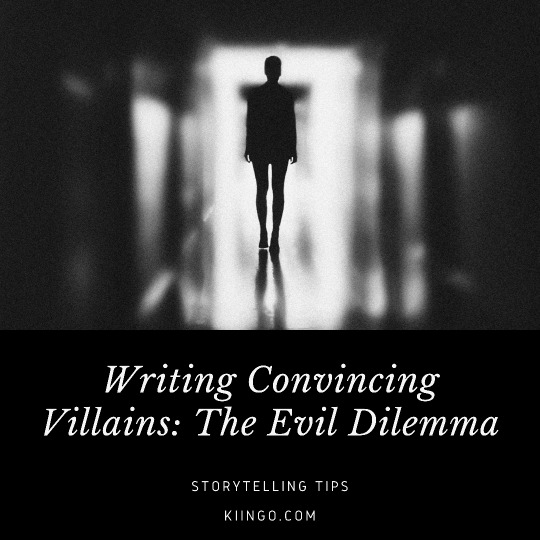
The Structure of Story is now available! Check it out on Amazon, via the link in our bio, or at https://kiingo.co/book
.
.
.
I sure love a good villain. I love writing them, I love reading about them, I love watching them on screen, and I love unravelling them.
When writing No Pain, No GameI thoroughly enjoyed developing the character of Sean Cravanaugh, the evil mastermind at the centre of the plot. The whole process was extremely cathartic. So much so, in fact, that when the book came out and readers hated Sean for being so horrible and manipulative, I was almost taken by surprise.
This did get me thinking: was my love of strong villains uncommon? Did my ability to write a convincing villain make me a villain at heart? How did other writers feel about their own baddies, and how did they go about writing them?
I had to find out.
The Nuanced Villainy Trend
One trend that’s become more prominent in recent years, be it in literature or popular culture in general, is a shift on how we look at and portray villains. Nowadays, characters from the dark side are more nuanced, more complex and more intriguing than they used to be. We don’t just see what they do, but why they do it and the reasons that drive their behaviour take us on a rollercoaster ride. We’re no longer looking at the bad guys at a singular point in time, where they’re already at the apex of their villainy. We’re given a full 360 degrees view of what’s got them to that point — we see the world and their experiences from their point of view, and they earn some sympathy points along the way.
And that’s the thing. We hate what they do, and we can’t condone their actions, but we tend to hate them, as people, a little less. We wonder what we ourselves might have done when faced with the same circumstances. Through that new lens, they become almost endearing.
This blurs the lines, to a large extent, and the world seems to love it. Gone are the days of black and white as we’re increasingly exposed to the other side of the more traditional hero-focused stories. This is a good thing, according to author Sabrina Voerman, who states that ‘we need more stories told by villains because [she] believes we are all a little grey. No one is all good and no one is all evil.’
Where Villains are Born (or: are you a closeted villain if you can write a good villain?)
This all begs the question: why do we love this new trend so much?
My guess? Because it speaks to the darker, imperfect, highly flawed part of us we try so hard to conceal in our civilised day-to-day lives. When author Freya McMillanworks on villains for her own books, she admits she ‘thinks about the darkness in [herself] and ramps it up a lot, so it’s still believable’. And we love it because we can relate.
So, do you have to be a villain yourself to write a good villain? Not necessarily (and rather thankfully, I might add). I believe it’s more a reflection that we, collectively, are starting to embrace every facet of what it means to be human. We’re letting go of the typical and rather unattainable hero-in-shining-armour ideal in favour of the myriad impulses, idiosyncrasies and desires that make us who we are as a species.
Creating a convincing villain these days is no longer about handpicking a singular cause to justify someone falling off the rails of socially accepted behaviour — abuse, loss and trauma being recurring favourites on that front. Instead, it’s all about exploring the complexity of human nature, psychology and the full colour palette of human emotions.
For Sabrina Voerman, it’s a delicate balance, because ‘villains have to have reason, and that does not always mean some traumatic event pushed them into being bad. [She] likes a villain that has good intentions, but will do anything to get there’. In fact, she highlights that ‘understanding the villain is key, and giving them a few redeeming qualities humanises them, allowing readers (or at least [herself]) to see themselves in the villain.’
Are Modern Villains Just Normal People Doing Bad Things?
So, where does this land us, I hear you ask?
Are we all villains at heart?
Are good, modern-day villains just normal people doing bad things?
Yes and no. We’re at least leaning into the idea that those once crystal-clear distinctions now have blurrier edges than before.
Modern day villains often stand somewhere in the middle between right and wrong. They’re divisive characters which we can’t help but ‘sort of like’ and ‘sort of loathe’. And we’re undecided because we’ve come to realise that, in the world we live in, where things get amplified, blown out of proportions and re-tweeted till they get viral, it’s increasingly easy for anyone to be publicly perceived and pointed to as a ‘villain’. Heroes can become villains, and vice versa. It could happen to anyone. At any time. Almost overnight.
In her writing, Freya McMillan looks at it rather simply: ‘[she] doesn’t necessarily describe them to [herself] as ‘villains’. In [her] mind [she] writes about people who are victim of circumstance, or are affected by traits that are beyond their control.’
Author Tara Lake’s view is similar. Her approach is ‘comparable to any character: [she] considers their limitations, their desires and motivations, and how far they’re willing to go for those desires’.
What does that mean for writers?
The key takeaway for us writers is that we need to keep moving away from the traditional and now antiquated, overly simplified view of good versus evil. Gone are the days of irreproachable angels fighting stone-hearted demons, dark beings who were born bad and only ever did horrible things for all the wrong reasons.
Quite the opposite, in fact. They have layers. Forget black and white, or even shades of grey. Like kaleidoscopes, they’re made of a thousand shapes and brushstrokes from all the colours in the rainbow. They’re intricate and intriguing, and because this all makes them more humanised than they used to be, they can easily be hailed as the underdogs we want to back.
As writer, I find this trend fascinating. The prospect of getting to paint a whole different picture when it comes to villains is incredibly exciting. It opens up a world of possibilities that forces us to think beyond stereotypes, to gain (and portray!) fresh perspectives and to experiment with our characters in different ways. Something, I’m sure, readers everywhere will also appreciate!
#writingtips#creative writing#screenwriting#writers on tumblr#writers#writing#writerblr#writing advice#writing community#writing resources
85 notes
·
View notes
Text
How Nesta Archeron and Zuko from the Last Airbender are the same but ACOSAF failed to make an actual character arc.
I've been trying to read ACOSF for around a month and it's been hard for me to finish due to the anger it gives me. This book has many problematic scenes but I will mainly talk about how Zuko and Nesta are pretty much the same but Nesta was never understood and her character was unable to grow or learn

Zuko has issues with his father which Nesta also had and both of this character have a missing mother which affects them and explains how they struggle to understand themselves and why they do certain things and how this affects them

Both have struggles with their powers, once Zuko decides to be a better person his powers are missing and he understands that his powers are driven by anger which could assimilate to Nesta when she believes that her powers are pure darkness but the difference is Zuko learned that fire is life due to the dragon trial he realized his power are not destruction and he learns again to control them but Nesta never learns, this 800+ pages never bothers enough to learn her powers instead is highly avoided and just used in less than a page of a chapter and the only time that it's pointed out as not dangerous is pointed out by amren which doesn't count as a growth. Nesta didn't learn to control her power or understood that it's not death but instead she is told her power is not dangerous.I won't count the use of her powers for the Feysaand baby because that pregnancy issue could've been resolved with so many plot options but no. Another strong female lead as a escape goat to save the day but lose everything.

Zuko hatred towards Aang is similar to Nesta towards Feyre. Even though Nesta never tried to murder Feyre like Zuko does to Aang both have a hate relationship due to the father. Zuko learns that his hate towards Aang was by the manipulation of his father and he realizes that he was a victim instead of the abuser because indeed his father was putting a huge task on a kid in order to gain honor when he was just a kid. This assimilates to Nesta, her father was unable to keep the three daughters in a good home and put the pressure on the sisters. Making feyre go to the forest and Nesta considering to marry a guy that would probably beat her up to safe the family and almost raped her . The difference is Zuko realizes that his father is the problem to his actions and forgives himself. Nesta never learns this because she blames herself of her father's death instead of realizing that her father is the reason why the three sister struggled. Instead of her crying about how her life was never easy, or come to a realization that not everything is her fault she actually blames herself and morns her father which makes no sense. Her father appears one time only out of the three books and it's only to die in the end without any accountability.

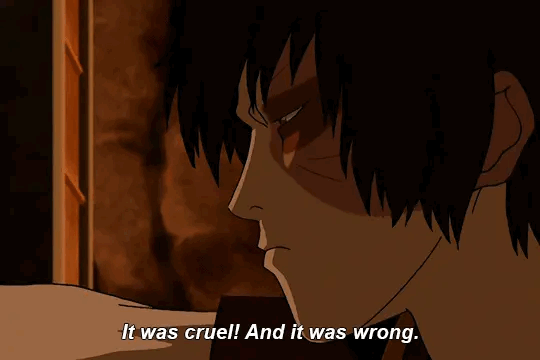
Zuko grows as a character when Nesta only learns to ask for forgiveness repeatedly to the wrong characters, never loves herself or see her worth. Zuko didn't go back to his family, he found a new family and even learned to earned it. He grew, understood himself and left everything that was affecting him . Nesta goes back to the same dog that bite her. People might excuse the actions that Feyre did to Nesta to banish her, I don't agree but I understand. But the repeated bullying, awful remarks and how they treat Nesta is awful. Rhyssand sees Nesta as a threat when not even once has she tried to harm anyone from the inner circle she actually saved Cassian, she offered to be the spoke person of the humans and even tried to build the wall with Amren. But in this book she's protayed almost equally as Tamlin which makes no sense. Rhyssand and Amren treat Nesta like a plague and use her as they see benefit in several chapters. Does Nesta find a new friend group? Sure, she does but she then asks for forgiveness to the same people that was never able to understand her or gave her the benefit of the doubt until they needed her. Instead of her finding a new path and form a new family she bows down to the dog that bite her and even says they gave her love when they didn't. Rhyssand never liked her and Amren even though friends in the beginning treated Nesta in ACOSF so horribly that not even in real life do I believe someone would ask for forgiveness to amren. SJM failed to seperate her love towards the IC and never bothered to actually give a story to Nesta. Zuko didn't go back to his father or sister. Though I understand the purpose is to have all characters happy. I felt like Nesta character was misunderstood many times thought out the book and instead of understand why she is like this, why she does this we only see that she was wrong all this time. Which is not true. Nesta is also a victim, she isn't the abuser they make her out to be which apparently is pretty bad . The only person she should ask for forgiveness is herself but we never see that. We only see how she makes herself as the problem and how everybody agrees. I believe that in this book she is having more troubles with herself than with anyone and for this reasons she should be the one able to forgive herself more than anyone else but we only she how she asks others. You can't love someone if you don't love yourself first and this goes as well with forgiveness
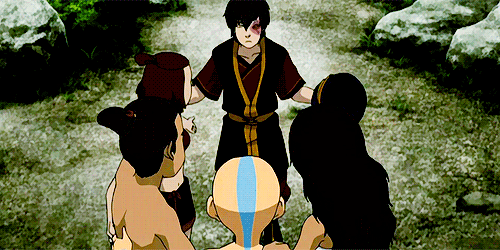
Both characters go through depression and both of them get someone to help them out . Zuko is lost because he can't decide between good and wrong and he even picks to be bad at some point but then regrets it. Nesta is depressed through out the book due to many things, from her past actions, her powers and so much more. The difference in here is the person that helped them. Uncle Iroh helps Zuko decide who he is and who he wants to be which causes Zuko confusion and anger because he believed his life was summarized in his father's orders and once he realized he isn't what his father wants him to be he struggles, but Iroh guides him and forgives him. Cassian fails to understand Nesta and instead of giving us atleast a couple of chapters of them talking deeply not just a paragraph of their problems, we get smut to cover the issue and this happens every chapter or most of them. This happens so much that even SJM stopped giving detailed smut scenes and she just mentions them with a couple of details. Instead of giving me smut she could've detailed their problems but we don't. We don't hear of how Nesta mother affected her in a deeper sense but we only listen to a surface of the problem. Cassian shouldn't be considered a guidance to begin with. Nesta needed someone that could understand her and help her. Not a character to write smut with. I would even consider azriel a better friend to help her due to his problem with the shadows than cassian and his often remarks of Nesta breast than her struggle of wanting to be alive.

At the end of the last Airbender you love every character even Zuko because you see his story. You understood him, saw his flaws and instead of hating him you ended up loving him when he was a villain at the beginning he even killed Aang in one chapter and still most people love Zuko. Because they were able to make his character redeem himself. That's what SJM failed to do. You never see in detail her struggles, she never grows or forgives herself. Never becomes the queen she was meant to be and it's sad. I have more opinions but I'll leave it in here it
#acosf#nesta archeron#nesta is a queen#cassian#feysand#nessian#gwynriel#Azriel#Acotar#Zuko#Nesta#Acosfrant#Rant#Nesta Cassian#Elain Archeron#Feyre Archeron#ACOWAR#Rhyssand#Amren
82 notes
·
View notes
Photo
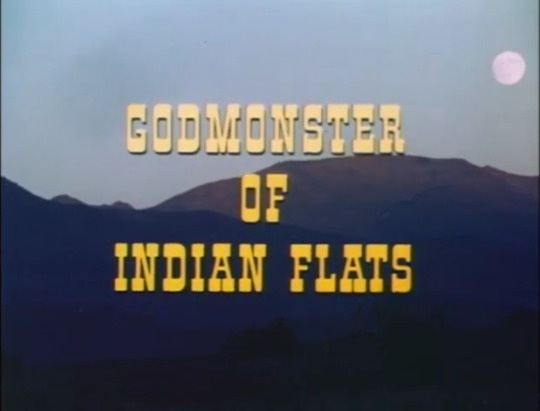
Godmonster of Indian Flats
If I had a dollar for every movie I’ve seen about a bloodthirsty mutant sheep, I would have... two dollars.
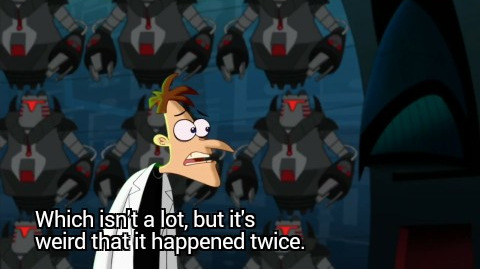
I was entirely willing to feature Godmonster of Indian Flats based on its strangeness alone, but it does have one connection to MST3K in that actress Peggy Browne was also in Avalanche. Another performer here, Kerrigan Prescott, also had a part in previous Episode that Never Was Fiend Without a Face, so hey, close enough!
Dr. Clemens and his assistant Mariposa discover a mutant lamb on Eddie the Rancher’s sheep farm, and take it up to a secret lab at Indian Flats for study. This seems somewhat outside of Clemens’ claimed purview as an anthropologist, but whatever, I’m just here to watch the movies. While the monster grows to maturity in a tank, the mayor of a local tourist town, Mr. Silverdale, is refusing to sell land to a Mr. Barnstable, who is interested in the mining rights. We soon get the idea that Silverdale is less interested in tourism than he is in having his own private Wild West LARP, and the townsfolk have an almost cult-like reverence for him. Eventually, their increasingly violent attempts to run Barnstable out of town cross paths with Dr. Clemens’ pet mutant, and all hell breaks loose!
Well, maybe not all hell. This movie hasn’t got the money for all hell. Rest assured, though, that they unleash all the hell they could afford.
The hell in question takes the form of a lumpy hunchbacked sheep creature with a rubbery sock puppet head, one long dangling arm, and a huge Kim Kardashian ass. It interrupts a picnic, and blows up a gas station by knocking over a pump with its bubble butt. It may or may not understand English, and it breathes poisonous gas when injured. The puppet is pretty weird and scary-looking in the darkness of Clemens' secret lab, but out in the full light of day it is ridiculous.
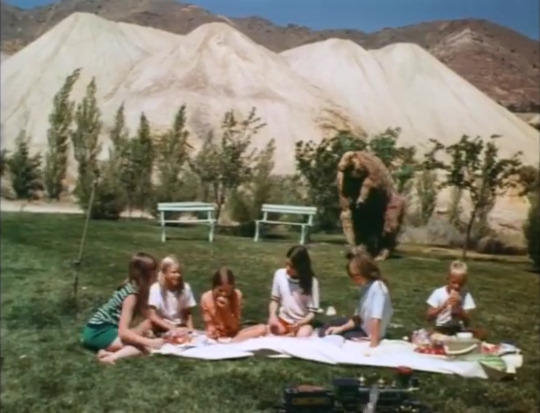
Any movie with a mutant sheep monster is going to be weird, and the monster is the weirdest thing in the movie, but make no mistake – Godmonster of Indian Flats sans monster would still be a weird fucking movie. The other story going on here, Silverdale vs Barnstable, is thoroughly bizarre in itself.
Apparently it's not enough for Silverdale and the townspeople to simply refuse to sell Barnstable their mining rights. Instead, they have to totally ruin his career and both his physical and mental health! First of all, they invite him to their 'Bonanza Days' and have him take part in a shooting contest, where the whole town conspires to make it look like he accidentally shot the sheriff's dog. Then they hold a funeral for the dog as if it were a person. The whole time the dog is fine – it was just playing dead, and afterwards the sheriff sends it to live with a friend.
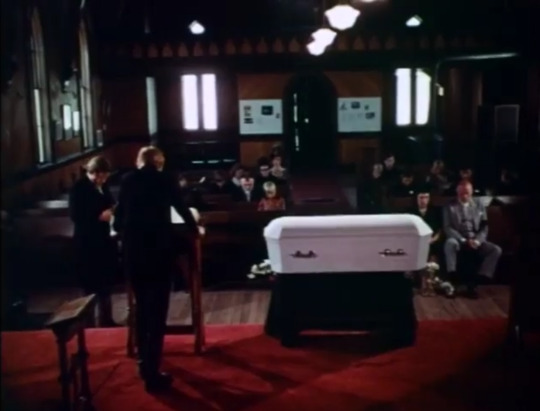
When Barnstable still doesn't leave town after this, Silverdale's toady Phil whacks him over the head with a bottle, then shoots himself in the shoulder and puts the gun in the unconscious man's hand. Barnstable wakes up in jail and demands a lawyer, but everybody ignores him. Eddie and Mariposa help him escape, and the sheriff then forms a posse to hunt him down and lynch him! At the end of the movie Silverdale triumphantly tells Barnstable that he's going to lose his job because his boss is embarrassed by all these goings-on. At this point Barnstable also has a cracked skull and a broken arm. He's a PTSD-ridden shell of a man and yet Silverdale is still yelling “I've beaten you, Barnstable!” as the end credits roll.
All of this might become a little less weird (but way more horrible) when I mention that Barnstable is the only black character with dialogue. And yet, none of it is ever overtly framed as racist. Nobody ever uses a slur – in fact, Barnstable's race is never once referenced in dialogue, not even obliquely. You could cast a white actor in this part and nothing would have to be changed. What Barnstable seems to represent, and what Silverdale and the townspeople claim to be fighting against (Silverdale declares that he is 'the custodian of an era'), is decadence and capitalism, concepts traditionally associated with a white elite.
This in itself should be read as a commentary on race. It's notable that Barnstable is playing by white rules. He's a smooth businessman representing the interests of his presumably white boss. When Silverdale invites him to Bonanza Days, he is happy to step into that role, too. He dresses the part and takes up the six-shooter, and does a pretty good job with it. Barnstable is a 'model minority' figure, a black man with the trappings of white success... and in spite of that, he is still abused. Hard as he tries to fit into the white people's world, he is not welcome there.
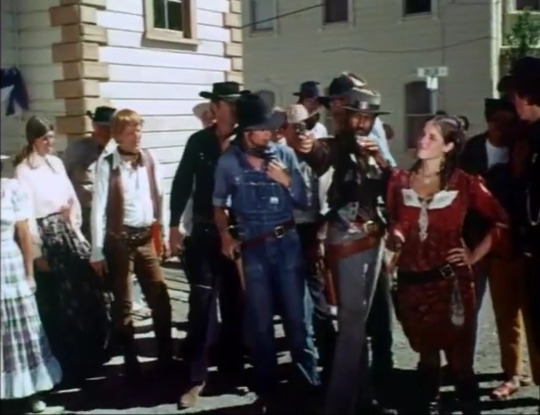
I don't think that's actually what Barnstable is supposed to represent to the viewer, however. The people of this town are described in the opening as 'living in the past' and we see that they're very dedicated to it. Silverdale dresses the part of a nineteenth century gentleman even when he's at home. Everybody dresses up in period costumes for occasions like parties and church, and the town's status as a tourist attraction requires many people to play such a role full-time. There's a dark underbelly to this quaint little world, as we see in the opening when a barmaid steals Eddie's casino winnings, but even that fits their chosen period.
Barnstable intrudes into this world as a representative of modernity and reality. If you're paying attention, you soon realize that the 'past' the townsfolk are living in isn't like the real past at all. The real history of this little mining town would have involved filthy, back-breaking work in the mines, and saloons full of drunks, prostitutes, and crime. The modern town has adopted the pretty trappings of the 19th century – the clothes, the horses, and nice little shows of piety like the dog funeral – while sweeping the dirt and violence under the rug. The latter are only to be turned on outsiders.
This fantasy version of the old west is also very, very white. In the real world, history is always more diverse than we usually think it was – one of the historical figures who inspired the character the Lone Ranger, for example, was Bass Reeves, the first black US Marshall in the west. The people in Silverdale's town have no interest in that. There is not a single Native American character in the movie, and I've already mentioned the lack of other people of colour, except for a couple of background tourists. This is an essential part of throwing away the ugly parts of the past – race brings conflict, and Silverdale and his followers want none of that. Barnstable's race makes his status as an outsider all the more obvious, both visually and as a reminder that the world these people are trying to live in never really existed.
This puts Barnstable in a very strange place in this movie. He's definitely a victim, but never a hero – in fact, Godmonster of Indian Flats is yet another movie that doesn't have a hero – yet he is not a villain, either. He's just some poor bastard who wandered into a horror movie and now he can't find his way out of it.
So... what does any of this have to do with a mutant sheep monster?
I dunno. There seem to have been mutants in this area for a long time, since Clemens talks about legends of a 'mine monster' and even shows off weird fossils he's found, but how does that tie into the theme of clinging to the past? Maybe it's supposed to be about history repeating itself, since new monsters are being born just as the mines are about to re-open? I have no idea.
Does the monster die at the end? I cannot tell you. I think it dies when the truck it was caged in blows up? The movie ends with an angry mob pushing the truck over a steep slope where they dump their garbage, while Eddie, Clemens, and Mariposa try to reveal Silverdale's own land-grab scheme. This all degenerates into chaos and people tumbling down the hill and shooting each other, while Silverdale stands there yelling about how violence controls the masses and how he's beaten Barnstable. It's an ending that seems calculated to leave the audience going, “... huh?”.
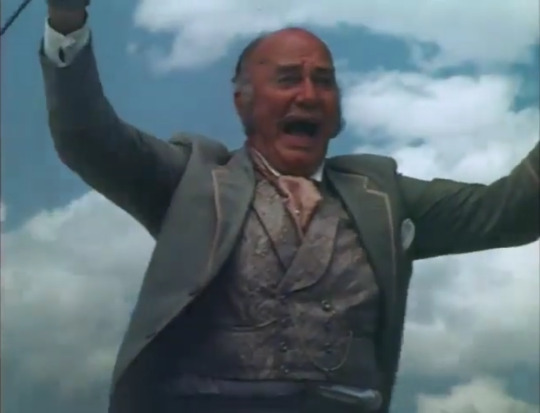
Why is it a God monster? Now this, I do have a theory about. I don't think the sheep is actually the godmonster – I think the titular menace is actually Mr. Silverdale! He wields a god-like authority within the town, even when his evil scheme is apparently exposed at the end, and uses it to do monstrous things! If that's not what they were going for... then I have no idea.
I mentioned in the opening that I've seen two movies about mutant sheep monsters. The other is Black Sheep, which is one of those off-the-wall movies they make in New Zealand when they're not doing Tolkien-related stuff. Black Sheep was apparently inspired by Godmonster of Indian Flats, but it throws out the race relations stuff and runs with the 'mutant sheep' thing to make on of the most perfect dark comedies I've ever seen. I would recommend it to the strong-stomached in the same way I recommended The Valley of Gwangi to anyone disappointed by Beast of Hollow Mountain – it is everything the older film should have been but was not.
#mst3k#reviews#episodes that never were#godmonster of indian flats#70s#just fuckin weird#allow me to recommend a better movie
41 notes
·
View notes
Note
It’s me the Shigaraki survivalist again lol
It’s cool you don’t agree I guess I just want to get my thoughts out
You said it’s unrealistic for Deku to save Shigaraki and them to work together—but the way I see it is that’s exactly what the story has been building up to. In a world where nothing is really “unrealistic” I really truly think it’s very in the realm of where the story is going. Shigaraki does look tired, because he has never been given a break. The thing is, BNHA isn’t a tragedy! (I think Hawks’s arc will be a tragedy but that’s a whole different discussion)
I just cannot see how Deku will be crowned “the greatest hero who ever lived” meanwhile the one person who needed him most is lying there dead. It just doesn’t feel convincing, especially in a shonen story. As far as the story is concerned, Shigaraki is still a child and never had a chance to grow up (it’s a coming of age story for Deku and Shigaraki). And you can’t celebrate being the greatest hero who ever lived while a “child” is dead. And I 100% expect Shigaraki and Touya to be very difficult to save (kinda like Kota from the training camp arc, but Deku saved him didn’t he?)—they’re gonna decline the help at first obviously. They have no reason to trust heroes, which is why I think Deku and Shoto are going to have to prove that they mean it—and they will, because they do.
I just feel like Shigaraki dying completely cancels out Deku’s main goal of “saving everybody”—which has been his thing since the beginning. Shigaraki was, in the eyes of the narrative, All Might’s responsibility to save, and he failed. Not only is Deku going to have to clean up the OFA/AFO mess, he’s gonna have to clean up the mess that All Might could have prevented (I’m not blaming All Might completely but as far as the story is concerned, and All Might is concerned—he definitely bares some responsibility for Tenko’s fate).
It’s as you said we don’t know what Horikoshi is going to do, but a girl can hope lol
I just don’t feel like the story is going to end with the message of “not everybody can be saved”. I just feel that there is so much more hope in this story than people give it credit for! Shonen typically reeks of hope and optimism, and even now BNHA still has that hopeful, optimistic energy, not grimdark realism. I think Horikoshi will pull this off and it’s gonna be awesome. And if you are right and Shigaraki does die, I honestly will consider it a huge waste of a character who could have and should have been saved, just like Touya, who I also think is 100% going to make it out alive.
Hey, Shigaraki Survivalist!
Glad you’re putting you opinion out here.
Getting onto matters, I would like to maybe clarify my statement: I do not think it is unrealistic for Shigaraki and Deku to work together (I think rather that it would be absolutely fair, and maybe cathartic) and I do agree that is what is likely to happen, sooner or later.
As for BNHA not being a tragedy, I think that it already is. Look at how Touya, Shigaraki and the same Izuku grew up: discriminated against, bullied, neglected and abused. If this is not a tragedy, I do not know what is. But if by that you meant that the general mood of the story is supposed to be one of instilling hope and instead letting people know that there is always a way one, and that there is still some possibility of saving if there is a will. I fully agree on that. The themes in BNHA are the real tragedy, but you are absolutely right when you say that the message is ‘People make mistakes. But that’s not the end. They can change and correct those mistakes, apologise, amend. Things can change.’ and not ‘Not everyone can be saved’ (even if, here, I would like to argue that Twice’s death message is exactly that but I don’t want to digress).
Also, not going to lie, I really like the positivity I feel from your message. It puts a smile on my face thinking that there is someone out there fully believing that salvation will come because there is someone who wants it to come. It’s a good thing. It’s a thing I, for one, do not have so thank you for doing that, this really brightened my evening.
Now, onto a more heavy part of the post. I wanted to talk about All Might, and how he did fail, even if not entirely by himself, to save Shigaraki. First of all, I would like to notice the particular panel which tells us that ‘You can save only those you can reach’.
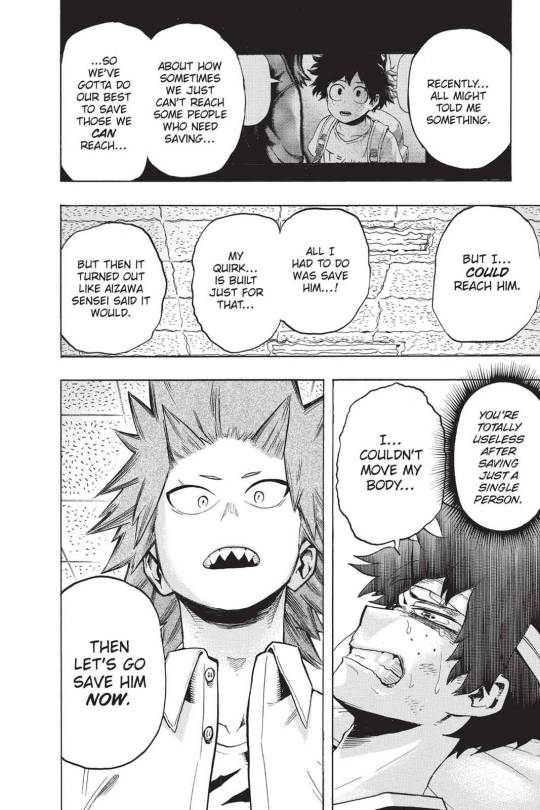
This panel is telling in more ways than one. All Might specifically addresses Izuku in saying this, while not literally meaning it (or at least not expecting Izuku to understand it so literally). All Might ( and I talked about it here) is a character which sets up the bar high for Hero standards (and is seen as an idol so far gone, that no one could ever possibly reach him) - and that is exactly why Izuku bears this 'lesson' stoically and tries to save everyone ever more than before. Because if All Might could do it, Izuku feels like he should be able as well (while not considering the disproportion in between them, and I mean in experience and just relatively emotionally).
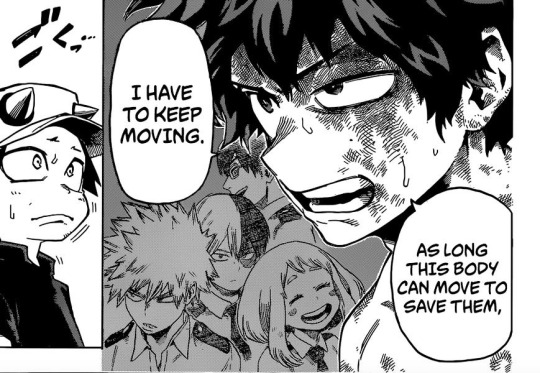
I mean Izuku feels a high burden with OfA, and to deal with AfO, and sometimes he can get very much extreme - but exactly for that, as you said, he would never feel as if he succeeded if he does not manage to save Shigaraki. Because if All Might is capable of brushing this aside, justifying himself by saying that he couldn't have done anything to prevent it and that it is impossible after all to save everyone, Izuku is not. Izuku feel so deeply that he cries for others, he rages for others, he longs for others with a great smile on his face because that is what it's expected of him.
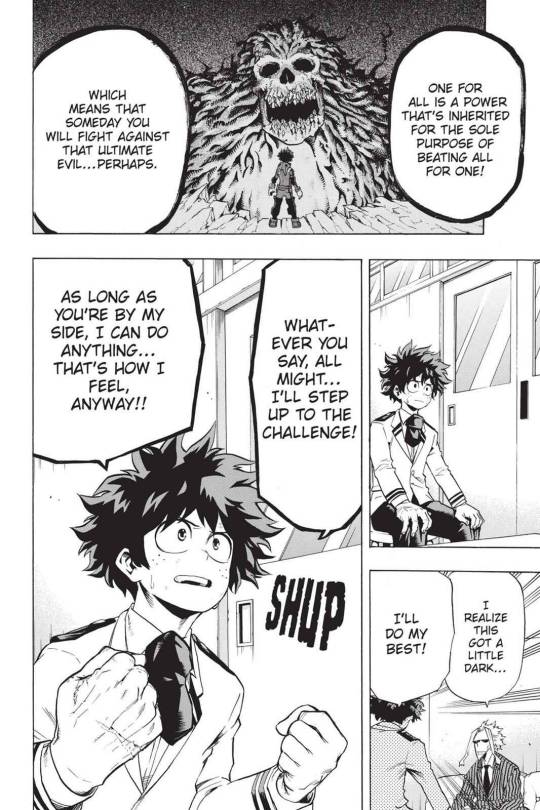

And he likes to fulfil those expectation, whether that kills him, injuries him or anything else (as we saw him being all bandaged up in 299 and with no sign to recover any soon).
However, this what I mean when I say that Tomura looks tired:
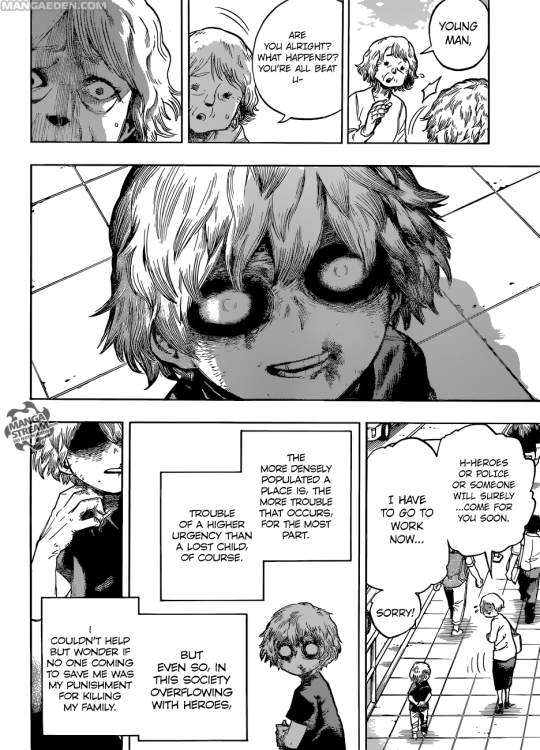
He fails to understand how him not being saved is not actually a fault of someone (heroes/society, you name it - even if he does realise much later), but his first instinct as a kid is to blame himself and to tell that this, is is his punishment. He deserved it. And he does deserve to a degree what has happened to him since, because he is guilty of something he will never be able to forgive himself for and that is why he is they he is now.
I do think, that Touya, even being more self-destructive than Shigaraki, is an easier subject to save. I am not saying this because I think Dabi’s trauma or problems are easier to solve, but because Shouto understood him (to some extent) and with the sentence ‘I am him? referring to Touya and his intentions he is unwillingly showing us that Touya’s path to redemption (summed with Endeavour’s arc) are all pointing at Touya being saved, no matter how bad the situation gets. He, still scarred and lonely, does have a family out there caring for him. Or at least wanting to get to the bottom of things and not leave him to burn to death, alone. Again.
Shigaraki, on the other hand, does not have such a thing. Kurogiri has been captured, AfO is using him and the only guy who thought of Tomura as a human being, other than a bad villain, is Deku. I do not want say that this is not enough, but with all the burden that Izuku is already carrying at the moment, can he also bear on himself the weight of saving Shigaraki? I really hope he does, but as anyway as it will be, I think that Deku will try. He will try to get that hand reaching out to Tomura and even if skeptical about it, I hope Shigaraki takes the chance and takes it. He does deserve a break. He deserves a blanket, a cup of steaming tea and a hot long nap in a warm bed. A hug is optional.
One of the themes I never touched upon is also, the found family of the League and Hawks. I really am waiting for more insight into the League’s members feeling for Twice, and maybe holding a funeral. I am also waiting for them to discuss Hawks.
On which, my last point for this post: Hawks’ story, serves as a parallel to Dabi’s. We see how the abuse can bring to two extremes: one becoming a villain and focusing on hate, and the other focusing on idolising and becoming a hero (and in the meantime trying to forget everything else). I want Hawks to face consequences for his actions, and I want him to understand that he, too, is a victim and that atoning for his father’s crimes is not the way to go. He also needs to break free of the past and let go. I really hope that instead of clinging into past ideals and Endeavour, he realises that there is something highly wrong with the society he is fundamental part of and that he break free. If he doesn’t, as has been already put out there by some amazing posts I read, it will after all end in tragedy. Once a friend told me how Hawks was a tragic hero, and I might disagree but I do think that the name is fitting. But it’s not like that will change things. Only we can - and I hope everyone realises that.
-
p.s. Look at this panel, during the last moments of fight between Shigaraki and Deku.
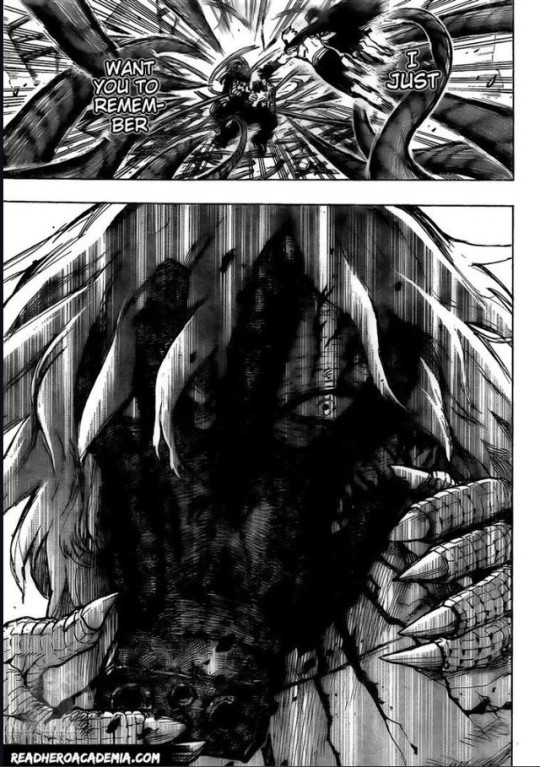
And after that the realization of Izuku, that Shigaraki, who he does want to save is not only suffering internally, but as well externally, because of AfO and whatever is going on. Exhausted beyong recognition.

Look at Shigaraki's form. He looks like he is right about to collapse. There is a hand stretched out, in help, in resignation, in sadness, in pain. But his other hand is almost clenching, hard, noy wanting to let go. Tomura is after all trying to fight the entity within him, while also trying not to lose himself and look out for everything that might come in its way outside.
And finally, there is someone who looks through the hand on his hand, through the cracks of his identity, through every wall Tomura has put in between himself and others in order to protect them, and himself, from the absolute monster he thinks he is.

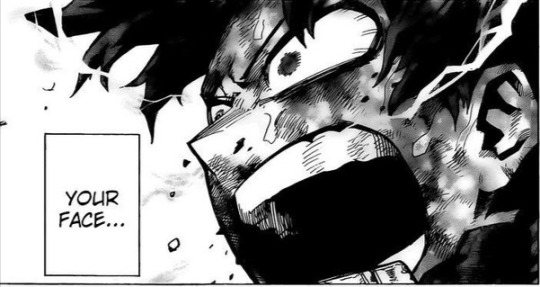
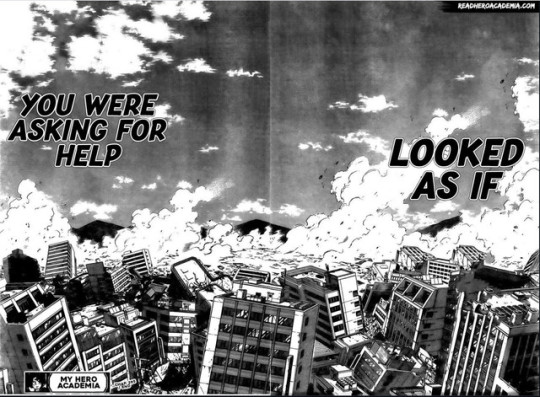
And it's, at the same time both ironic and daunting how these same words are also the works Deku speaks to Kacchan while saving him from the Sludge Villains. There is a direct parallel between Katsuki, who had hated Deku while being afraid of being inferior to him and that did not want his helo because he would feel too weak, and Shigaraki, who has no will of getting himself saved by anyone, but especially by the kid that denied him the objective of gaining OfA and defeating everything and the same kid who seems to feel something other than disgust for him. Both Katsuki and Shigaraki are opposites to Izuku.
So, if Izuku saved Kacchan, who in return saved Deku after accepting the fact that he and Izuku, are, after all, hero AND friends who care about each other, it would be nice to see where this is going to go with Tomura. And see if, maybe, just maybe, it is possible for Shigaraki to stop being Shigaraki and be Shimura Tenko instead.
#bnha#mha#my hero academy#bnha 300#bnha meta#bnha spoilers#mha 300#mha spoilers#shigaraki#shigaraki tomura#shigaraki survivalist#shigaraki supremacy#shimura tenko#lov#league of villains#boku no hero academia#sunn answers#bnha analysis#mha analysis#deku#izuku midoriya#hawks#todoroki family#Todoroki shouto#endeavour#all might#yagi toshinori#dabi#todoroki touya#bakugou katsuki
86 notes
·
View notes
Text
I’m rewatching the Puppetmaster for ~research~ and ugh.This is such a good episode but I cannot stand the treatment of Hama and also Katara’s special bending ability. And I’m gonna talk about it because I can’t help myself. But I also want to offer a solution maybe something that the writers could have done instead. Granted I’m a white US American so while I am about to talk about imperialism, anti-indigenous racism and racialized misogyny, I am coming from a position of privilege here and ymmv. It’s important that we as fans (especially white fans) acknowledge the things that our favorite stories can do better so that we can make our fandoms safer for everyone.
And btw fans of color have been talking about this so I definitely am going to be quoting some phenomenal bits of critique I have read on here. Also you should follow @shewhotellsstories and @visibilityofcolor for anti-racist fandom commentary.
I am also going to talk about grooming, so just be aware if that is a trigger for you.
I. Hama as a Campfire Horror Story Monster
The episode starts out with the Gaang camping in a creepy forest telling ghost stories to each other. Set to spooky music, Katara tells a story about something that happened to Kya, a friend named Nini (likely) dying in a snowstorm and then haunting her family’s home as a ghost. Immediately after, Toph hears people screaming under the ground - and then Hama finds them and invites them to her inn.
Every so often, Hama says something spooky with the spooky music playing. Katara immediately takes to Hama, but the others (especially Sokka) find her pretty unnerving. Katara says she reminds her of Gran Gran before Sokka starts snooping around and finds a bunch of puppets and a comb from the Southern Water Tribe. It’s the standard horror movie fakeout.
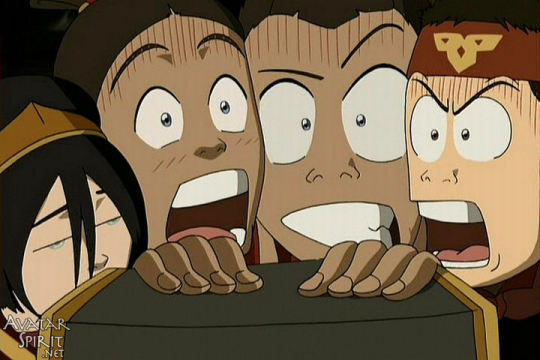
Every so often we get an artfully placed hint about Hama’s agenda - pulling water out of thin air, showing Katara that “plants - and all living things” are made of water. And oh yeah, she makes herself ice claws. Cool skill, but in the context of the episode, a little more unnerving.
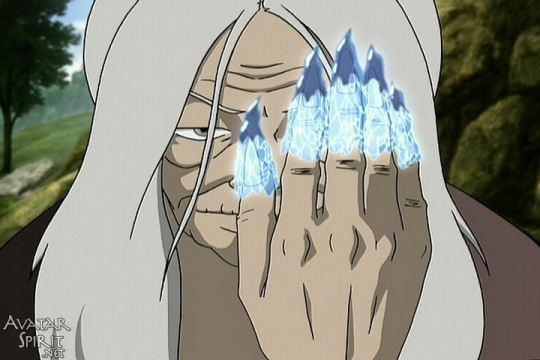
The “moon monster” that Old Man Ding mentions, the alleged Moon spirit, turns out to be Hama (of course) and the tension builds to a peak as the Gaang rush to save Katara from the “dark puppetmaster” that has imprisoned the villagers.
Meanwhile Hama and Katara stand under the full moon washed in spooky cool lighting with an ominous breeze around them. You see Hama practically transform into a monster in a way sort of reminiscent to a werewolf - her fingers become claw-like, her veins pop out. I don’t think it’s a stretch to say it’s a coincidence that as she reveals her true agenda, she becomes less human in appearance. Which... okay I’ll get to that later.
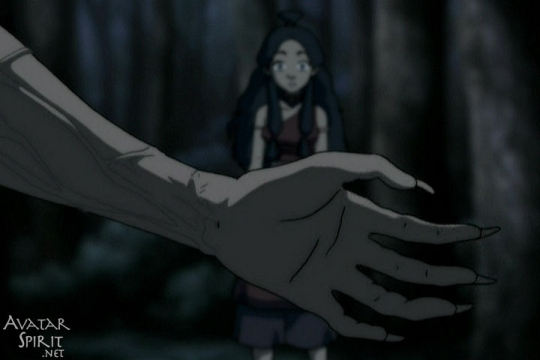
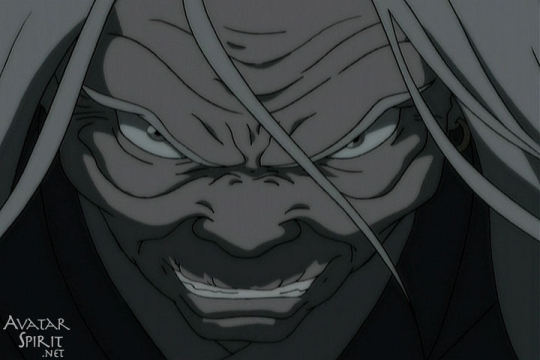
While I can’t say that Katara fits the Final Girl trope very well, I do think it’s interesting to note that horror movies often do feature women as heroes who defeat the monster/killer/whatever and usually the Final Girl is used to allow audiences to experience the full horror of the villain, which absolutely is how Katara is used here. Yes, her friends come to help, but she saves everyone in the end (my queen).
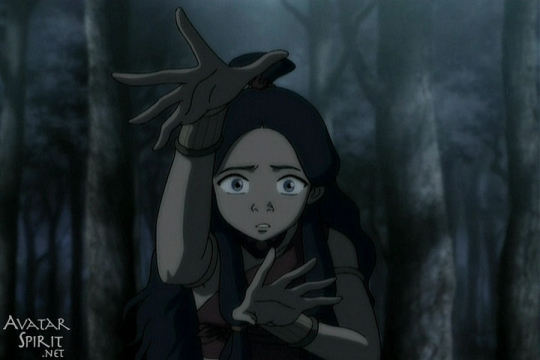
So here’s why that’s bullshit.
Framing Hama as a horror story monster make sense when you don’t think about the Implications of framing the indigenous woman POW living surrounded by people who have benefited from Fire Nation imperialism. It does - it’s a common trope: the reclusive witch who first seems kindly to some lost/wandering children before revealing her true intention - to use them for her own purposes. Yeah, I know they’re playing on Hansel and Gretel. But yeah, I’m gonna call bullshit on that too - drawing on a c*nnabalistic witch for inspiration when you’re writing an indigenous woman character is probably not the way to go.
II. Hama the Puppetmaster* and Groomer
A puppet master is obviously a puppeteer, and Hama has puppets (creepy though they may be). But in terms of the underlying meaning, she’s a chessmaster, an Emperor Palpatine/Dick Cheney kind of master manipulator who works mostly through other people. What most people would consider a psychopath (in layman’s terms). When her friendly mask falls, she is terrifying.
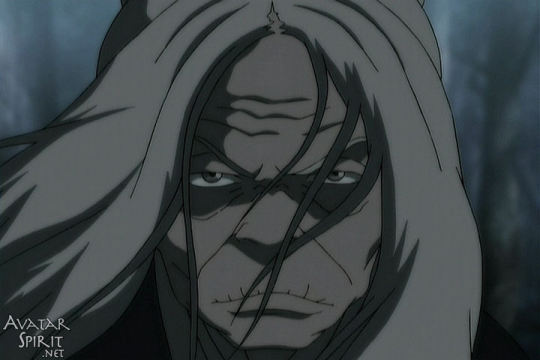
She is cold, calculating, manipulative as fuck - she isolates Katara almost immediately. Hama uses Katara’s desire to connect with her culture to groom her to become a weapon. It’s actually such a good example of grooming that it has to be purposeful:
Targeting a victim - Hama hears that Katara and Sokka are from the SWT. She also hears Katara tell a story about Kya. To Hama, a waterbender from her own culture is a hell of a target.
Gaining trust - Hama reaches out to Katara in particular, is especially kind to her, gives her individual attention that the others don’t get. She prepares a SWT feast for them and tells the Gaang about her heritage when they go snooping.
Filling a need - so once Hama has given Katara reason to trust her about waterbending, she promises Katara to pass on SWT waterbending heritage that only Hama knows. She fills a unique need of Katara’s.
Isolation - From then on out, we don’t see Katara with the rest of the Gaang until the end of the episode. Hama seems like a normal teacher but she does start to drop little hints, pushing Katara very gently to see how she will react to her real agenda and desensitizing Katara to what would otherwise seem unacceptable coming from someone else who hasn’t established that unique trust. “You’ve got to keep an open mind, Katara.”
So this would be the point at which Hama would make sexual contact but this is metaphorical so that obviously doesn’t happen. What does happen is Hama pushes Katara’s limits. She makes her pretty uncomfortable with the idea of killing the fire lilies for water, but when Hama appeals to their shared history of marginalization she gets over it.
Maintaining control: Hama makes her final move, which is obviously bloodbending, and reveals her true agenda - and when Katara refuses to manipulative living beings’ blood, Hama violates her bodily agency. And not only this, but she pushes Katara into bloodbending when she victimizes the Gaang, fully realizing her control.
Hama sees it as a victory, and telling Katara breaks down at the end in one of the most emotional scenes in the show. She feels like so many of us have felt at some point: violated, betrayed by someone we trusted. And then they never really deal with that.
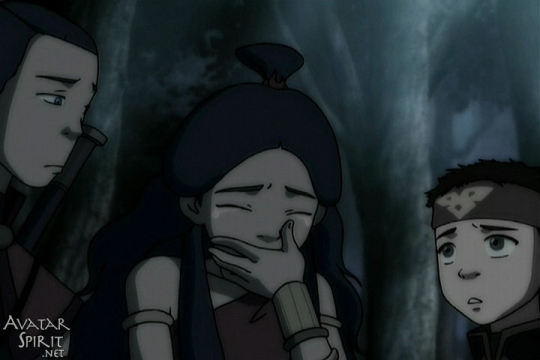
I actually think that’s the point of The Puppetmaster, especially given ATLA being a show for children. I think it’s supposed to be a metaphor for csa.
And... okay.
Undoubtedly it is important to send these messages to kids. And yes, people usually are victimized by those closest to them, by those in their own communities. But not indigenous women. I’m not saying it doesn’t happen, but according to the National Congress of American Indians, Native American women and girls are more likely to be sexually assaulted by non-NA men. 57% of cases are perpetrated by white men. Not the people in their communities.
Choosing to tell this story with an indigenous woman POW (who very likely would have been victimized herself lbr) is a choice that I find really aggravating. When writers tell stories with a Point, it is incredibly important for those writers to understand the implications of what they are saying about the characters who they are using to make that point.
Like I’m not saying don’t make that point, or don’t use Katara (who would in real life be at a higher risk of sexual violence than the others) to make it, but why make the perpetrator someone who is statistically unlikely to be Katara’s abuser? I’m not sure I have a good answer to that question. My guess is, like with making Hama animalistic and about as unsympathetic as it gets, the writers just had blinders on about the cultural implications of what they were saying.
Not even considering the whole victimizing-the-“innocents”-of-the-Fire-Nation-town plot, Hama’s not a good person. This is probably because she was driven mad by the need for revenge, which, eurgh okay, but still it’s very apparent that she is not interested in winning over Katara’s support directly or honestly.
* also the antisemitic history of this trope hmm.
III. Hama and The Victims of Genocide Victimizing Oppressors #NotAllFireNation
Okay. So this is the part that I think annoys me the most because it’s so bad. Like, imagine for a minute that you’re a white guy and you’re gonna tell a story about a victim of genocide who is completely divorced from her culture and homeland, and furthermore is an escaped prisoner of war who has radicalized in prison - okay it just hit me, I know what they MIGHT have been going for, like maybe some kind of anti-Gitmo statement? But that didn’t happen. People who were stolen away from Iraq and imprisoned illegally in Guantanamo Bay, and who were released after being detained illegally, haven’t really shown any real radicalization. They’re pissed at the US for victimizing them, but like that seems pretty fair considering so many of them did nothing wrong.
That’s been the US government’s excuse for not releasing innocent people who were detained illegally. The idea that prisoners of war radicalized in Gitmo so they can’t be released because they’ll attack the US is propaganda. I’m not saying it hasn’t happened, but that’s where it comes from.
Considering the time period ATLA was written, considering how much of it was inspired by the US wars of aggression and imperialism, considering how political ATLA is (and why it was so popular during its initial run - during the years that Bush lost a ton of popularity) I think if that’s what they were thinking about, that’s not great.
But for all of Avatar’s good messaging on imperialism and war, it’s still written from a white US American mindset. Well surely I’m not responsible, surely you shouldn’t imprison and abuse me, a random white girl in the States. It’s my government, which I cannot control because of two-party politics or some shit.
So first off, that’s shitty because oppression is often about systems, not individuals. Sure we need to always consider the individual experiences of people who are victimized, but the people who are benefiting from imperialism? Me? Fuck if I care if someone in El Salvador or Iraq or Chile or idk any of the countries we have meddled in, let alone from a marginalized community in the United States, hates white US Americans for what our government has done - and that’s even silly because white US citizens support our government. Like we think the institutions are sound, although sometimes we don’t support the guy in charge. We think the cops are going to help us, even though that isn’t really the case.
Why frame it about what she’s doing to the Fire Nation civilians at all? Why make Hama the villain? I don’t think they wanted her to be unsympathetic, I mean they tell her story and I don’t think anyone would conclude that it doesn’t justify her desire for revenge, but why tell this story through a victim of genocide?
Recently I saw a post by @sunkin-akh where they point out that Hama basically quotes Malcolm X:
I was literally just watching the Hama episode again and I just noticed for the first time that while forcing Katara to bloodbend she says that they must fight back against the Fire Nation (and she used this exact phrase) “by any means necessary”, which is Frantz Fanon’s phrase popularized by Malcolm X during the Civil Rights Movement (iirc). They directly compared Black liberation to Hama’s evil acts and it disgusted me.
The full context:
Hama: The choice [to use bloodbending] is not yours. The power exists. And it’s your duty to use the gifts you’ve been given to win this war. Katara, they tried to wipe us out, our entire culture, your mother.
Katara: I know.
Hama: Then you should understand what I’m talking about. We’re the last waterbenders of the Southern Tribe, we have to fight these people whenever we can, wherever they are, with any means necessary.
I find that so appalling because it is framing resistance, specifically anti-racist resistance, as barbaric and monstrous. And given the way that Hama is portrayed at this point, about as inhuman as anyone in ATLA, that is extra gross.
Finally, after Katara defeats Hama, she is lead away by the authorities in CHAINS.
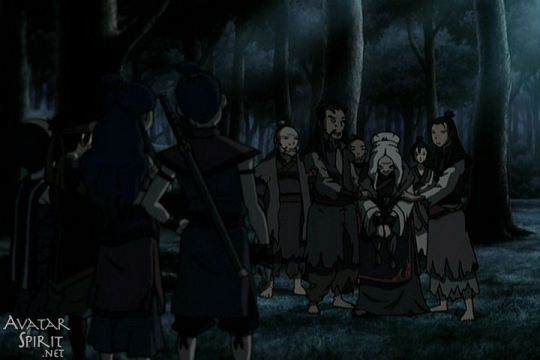
So now the FN cops are the good authorities who we’re gonna trust a SWT waterbender with? I mean she’s a villain so we’re probably not supposed to feel bad for her, like yeah sure the FN is usually bad but she’s a criminal so it’s okay that they take a POW back into custody.
No, no, no.
I know I am reading into this far more than the writers intended - but that’s kind of the point of critically engaging with media. Because shockingly writers don’t always question their choices - they are people and have implicit biases just like all of us. When those writers come from a privileged culture that has colonized the culture they are using as “inspiration” for their story, they need to be extra mindful of how they represent those people.
IV: How To Write Hama
Well, I’m not gonna talk over indigenous fans on this one on specifics, and you should read this rewrite by @kispesan but my thoughts generally are:
lose the horror framing it’s just not right for this context and this character
don’t frame Malcolm X as a villain because that’s nasty and racist
have Katara learn to use bloodbending in ways that she is comfortable with (and not just like once in one episode where she’s extra vengeful and the hero of the show doesn’t approve of her actions JFC) and don’t make the dark-skinned girl the only character whose special bending skill is dubious (I know she also has healing but still)
bring Hama home
have indigenous people in the writers room
Anyway, I’ve gone on wayyy too long. Let me know if I am speaking out of turn please if you feel that I am. and I’m sure I had other thoughts but if you want to read some other good pieces of Hama meta, I’ve listed some below:
post and another post by @marsreds
this post and this post by @visibilityofcolor
this post by @shewhotellsstories
anyway katara is a queen and should have been allowed to heal, and hama never should have been irredeemable because if you can make iroh redeemable, if the show was going to redeem AZULA, you can make hama redeemable.
#hama#racism#atla fandom#fandom racism#katara#some amazing people on here who i hope don't get mad i mentioned them#grooming tw#racism tw#i sure hope i remembered everything i wanted to say butttt
81 notes
·
View notes
Note
Bit late and random but it's the anon you leave food out for here to give away I am also bi and I think exactly the same as you about bi val pretty much, every time Derek offers me representation my reaction is to slowly, hesitantly take it and say "thaaaaaaaaanks..." while rolling my eyes, in much the same way one accepts their least favourite flavour of sweet from an annoyingly enthusiastic uncle-type-individual. Ironically I feel I had more in common with her before the bi shit started up.
What I find really amusing is that Landy actually did reasonably well at representation when (and only when) he wasn’t trying.
Oh god, this got long, anon, my ass rambled.
tldr; I'm glad actual bi people dislike bi val (or how Laundry handled bi val) as much as me, this will probably offend at least one person but i don't really care, Dirty Laundry wrote better rep when he didn't mean to write rep at all, and if he ever starts trying to "represent" groups I'm part of I'll take him out back like a dying horse and shoot him.
Like, yes. He had stupid and potentially offensive shit - I say potentially because what offends one member of a group won’t necessarily offend all of them. His attitude to mentally ill people is, frankly, disgusting. We’ve had “Skulduggery can’t be abused, he doesn’t have feelings”. We’ve had “eVeRyOnE iS bI eVeNtUaLlY”. We had Ping, who seemed to be pretty much universally offensive. And that's what's always going to happen when a straight, cis, white, wealthy, male author tries to write marginalised groups he doesn't know shit about, because inevitably he's going to fall back on stereotypes.
But we also had:
SEXUALITY REP: Phase One's nonstraight characters were treated like the straight ones, and like, isn't that the whole point? There was no need for a massive Coming Out Story TM to grab for those sweet sweet Woke Points, because sexuality isn't supposed to be important to mages. I never understood why Val needed that whole Coming Out Panic storyline. Like...Des and Melissa are ridiculously supportive, encouraging, loving parents. They accepted you dating a ~19 year old when you were ~16. They accepted you revealing you could do fucking magic and that you'd been lying to them for like seven years. They took your undead buddy in stride and the most pressing question your dad had was whether magic toilets exist. There is zero reason to think that "I'm bisexual" is gonna be the thing that makes them flip and throw you into the streets in disgrace, Valkyrie. Come on.
Tanith had girlfriends and it was just mentioned casually, because it's normal.
China had massive UST with Eliza. That was an opportunity right there to not only include a f/f relationship, but also to bring back one of the few precious surviving characters from Phase One, using characters and a relationship that already had several books' worth of setup and tension and interest from fans.
The Monster Hunters have a casual conversation about which one of the Dead Men they'd date.
Ghastly has a conversation with Fletcher about the pain he's been through being in love. He never uses any pronouns.
It was confirmed at one point re: the Dead Men that at this point, after 300-odd years, everyone's been with everyone else at some point.
Thrasher is gay, and while Scapegrace's...everything...is treated as a joke/comedic relief, Thrasher's love for him isn't. He's completely devoted to Scapegrace, and that in itself is not played for laughs, even though the rest of the scene usually is. Thrasher's description of their first meeting is essentially a love-at-first-sight situation for him.
"ABNORMAL" RELATIONSHIP REP: Age gap relationships are normal for mages. Off the top of my head, using only canon, canon-implied or almost-canon ships:
Ghastly/Tanith (~350 year age difference)
Tanith/Sanguine (~250+ year age difference)
Tanith/Saracen (~350 year age difference)
Caisson/Solace (~250 year age difference)
China/Gordon (~400 year age difference)
Kierre/Temper (~500+ year age difference)
If you include fan ships, there's also things like Mevolent/Serpine or my Mevolent/Vile, which are both ~600 year minimum age gaps based on the timeline, or Valdug (and its variations) which is ~400 years.
Now, whether you consider this kind of rep positive or negative is up to you, but it’s there.
MENTAL ILLNESS REP: more like "Which characters in this series don't have a mental illness or a personality disorder?" I have some of these issues, but not all of them, so this is just how I read it, but:
ADHD: Skulduggery
Dissociative Identity Disorder: Skulduggery & Vile
Dissociation: Skulduggery again, most notably in DD and DB
Schizophrenia (or similar): Valkyrie & Darquesse, Valkyrie "seeing" Darquesse's ghost thing in Phase Two
Impostor Syndrome: Reflectionie
Autism: Clarabelle
Trauma/PTSD/CPTSD: Skulduggery, Valkyrie, China, Ghastly, Erskine...pretty much everyone has a believable, understandable, morally grey trauma response in this series. People struggling with trauma are spoilt for choice of characters to see themselves in.
TRAUMA REP: This series is a trauma conga line, but everyone has a believable, understandable, morally grey trauma response in this series. I see little bits of myself in more than one Phase One character.
Childhood Abuse (of varying degrees & types): Skulduggery, Carol & Crystal, Omen, Fletcher, Ghastly, China, Bliss, Sanguine...
Estranged Family: Skulduggery abandoning his crest, Fergus & Gordon, China & Bliss
Bad Romantic Relationship: Skulduggery is also very clearly an abuse victim. He’s got a solid history of romantic attachments to women who manipulate, use and gaslight him for their own agendas. There's a whole paragraph in SPX about how Abyssinia broke him down, isolated him from his friends and preyed on his desperate need to be loved, all classic abuse tactics.

And I’m personally a huge fan of this backstory for two reasons:
1) Society likes a plucky victim in media. The "My suffering made me stronger" type of victim. And it's not always like that in real life. Not all survivors come out of their abuse stronger or kinder or more understanding. Some of us come out cold and fucked up. Some of us end up as emotionally stunted, bloodied-nails-and-bared-teeth survivors, broken in ways that can't be fixed and sustained by enough rage to power a small sun. But society doesn't like to tell the story of that kind of survivor, because we're not usually a likeable protagonist. When we're shown in media, we're usually the sympathetic villain, or maybe the antihero. But Skug is someone who's done awful things and lost pretty much all his faith in humanity and been burned more times than he can count, and he still makes the conscious choice to try and be the good guy when he could so easily go Evil Supervillain on the world, and I don't know about any of y'all, but I've modelled myself on him in that. I've made the choice to do something good when all I really want to do is just become a horrible, shrivelled ball of nastiness and revenge. And that's because I saw him do it and realised that I could do that too.
Skug is an incredibly capable, strong, masculine Man's Man. He gets in fights all the time, and he usually wins. He's military, an industry that's Really Bad for stigmatizing weakness and mental illness, and he's right up at the top of the hierarchy. Almost everyone is afraid of him. He's a straight up cold-blooded killer. Skulduggery Pleasant is precisely the type of person who's not normally portrayed as a victim of anything. Nothing about him screams "victim" at all. But his abuse history is insidious. He's so conditioned to respond in a certain way to abuse from the women in his life, probably from a very young age, that despite all that strength and capability and stubbornness and ego, he just goes along with it. And it's an established pattern going back hundreds of years. He keeps going back to China, even though he knows she's bad for him and his friends keep telling him to stay away from her. Abyssinia latched onto him when he was traumatized and vulnerable and weaponized it against him to make him easier to control - and when she reappears, hundreds of years later, she jumps straight back into using, tmanipulating and gaslighting him and not only does he let her, he doesn't even seem to realise that behaviour is abusive. He thinks it's normal! That's how he's always been treated by his long-term girlfriends, with the notable exception of Wifey. Even when Val is being fucking nasty to him in the first couple books of Phase Two, sniping and lying and blaming him for everything under the sun, he just takes it. There's no attempt to tell her she's being unreasonable, no telling her to fuck right off and give her head a wobble, no defending himself even when she's bitching over something that isn't even his doing. And this is a man who has an absolutely gleaming steel spine the rest of the time; Skug has no problem saying no to anybody else, but he can't get past the way he's been taught to treat the important ladies in his life. Skug is a walking reminder that anyone can be a victim of abuse, even the ones who seem least likely to be susceptible.
GENDER REP: This one is the most iffy out of the bunch and definitely was not done very well in the eyes of the people who matter most, but I'll include it anyway because it mattered to some.
So there's Nye, who's...agender? Genderless? And uses "it" pronouns? Nye was generally considered horrible rep because it's also a war criminal and experiments on people and I've seen people say "Well I don't want to be seen like that" but? It's still possible to be a war criminal and also genderless. I never saw the two things as being related or relevant to each other.
There's also Mantis, who's in exactly the same gender/pronouns boat as Nye and always seems to be forgotten about, which sucks because Mantis is a war hero. It fought for the Sanctuary during the War and they never lost a battle when it was in command. It's called out of retirement to fight for the Supreme Council in LSODM, ends up fighting alongside Skulduggery during the Battle of Roarhaven, and ultimately dies attempting a very brave, very risky strategy. Mantis is, unreservedly, one of the good guys. It was also my introduction to sentient beings using "it" pronouns, and did it in a way that felt natural, so when I met my first person online who used "it" pronouns and hated to be referred to as he/she, it was...weird, but not as weird as it would otherwise have been, because I was like, "Oh yeah, like the Crenga. Okay."
And then there's the Scapegrace sex change plotline, which...I might have an unpopular opinion on this one. From what I’ve seen, trans people don’t seem to think was handled well or with any sensitivity at all. I’m not trans, so if the trans community says he was being offensive to them, I’m not going to claim otherwise. But...I first read the Scapegrace plotline as a young teenager in a tiny rural school with zero diversity, going through a period of being deeply confused about my own gender identity. He was more or less my first introduction to the idea that genitals =/= gender. I was relieved, at that point in my life, to read someone having a lot of the same thoughts I was having about being in the wrong body. So while it may have been badly done and yeah, the series would probably have been better without it, it did make at least one kid suspecting she might not be cis go “Huh! So there are other people who feel like this.”
Thrasher is also implied to be legitimately trans/gender-questioning, and that's not played for laughs either.

So? Phase One, while it absolutely had faults and issues and things that were just "Oh god why", was actually full of rep, at least compared to the other series that I read as a child/teen. But? As soon as Dirty Laundry started trying to be woke? He fucking sucks ass at it. Aside from confirming Phase One's hints that Skug has a background of abusive relationships, every single attempt at shoehorning rep into Phase Two is Bad.
The painfully OOC, forced, badly-written awkwardness of Val suddenly being rabidly horny for women out of fucking nowhere. The stilted, forced cringiness between her and any of the women she's flirted with - contrast that with Sorrowscorn's interactions, full of natural chemistry that had us all like 👀 I mean, I never shipped Val/Melancholia, but I could always see why people did - they had miles more chemistry than Val/anyone in Phase Two.
The fucking mess that is v*litsa, because if someone says "I'm really not interested in friendships/relationships right now", clearly the route to true love is to bulldoze their boundaries and forcibly insert yourself into their life and proceed to treat them like a delicate soft uwu flower, completely ignoring the horrible things they've done, while gleefully damning their best friend as an irredeemable monster for the exact same things, which is. You know. Gonna affect your so-called love's self-confidence and self-esteem because she knows she's no different to him. Y'all know I love an angsty ship, an unhealthy ship, a ship with fucked power dynamics, but I literally cannot roll my eyes any further back in my head at this shit. I never read Demon Road, but from what I've heard from friends who did, it does seem like every time Laundry tries to write an f/f ship, he comes up with a cringey abusive/manipulative caricature and tries to call it rep, and he needs to Stop.
Val's Mental IllnessTM arc. It's funny how he wrote Skulduggery as a wonderfully complex character with deep-rooted psychological damage and long-lasting trauma, but believes he wrote a character with "no feelings" - but when he tries to delve into the damage the world of magic has done to Val, he turned her into a weak, whiny drug addict who treats everyone around her like garbage and is so selfish and dislikeable that I? Honestly can't even reconcile Phase Two val with Phase One val. They're two completely different people. He's shown on Twitter that he doesn't have any respect for mentally ill people, and it shows. Other mentally ill people might see it differently, but the whole thing just makes me go "yikes".
Never, who has no personality outside of being genderfluid, and whose pronouns make no sense. I'm sorry, I have never met an nb person who insists that you change from male to female pronouns multiple times in a sentence, every time you refer to them. It's confusing as fuck. Now I have been told that Never has apparently received some character development in the last couple books, and if so, fair play, but I quit reading after Midnight, and Never and the rest of the personality-less new characters introduced in Phase Two who just seemed to be 2D Stereotypes to snag Woke Points were a big part of why, so. Development too late, I'm afraid.
(Now, if anyone is looking for a well-written genderfluid character, I recommend the Tawny Man trilogy by Robin Hobb. I have a lot of issues with her as a writer, and unfortunately I hate her POV character which puts me off the series as a whole, but she wrote the Fool/Amber/Lord Golden and their gender identity/approach to sexuality with so much more respect and realism. That is the kind of rep nb people should be getting: 3D, complex, realistic characters whose gender is only a tiny fragment of their personality, not the be-all-and-end-all of their existence. You know. Like cis people get. Nobody wants to be represented by a 2D cardboard cutout stereotype.)
Anyway idk how much sense this makes it just really amuses me that Laundry would include all this rep completely unintentionally and then go on Twitter and remind us all that actually he's a massive asshole via insensitive/offensive tweets about the groups he'd actually done a fair job of including (i.e. Skulduggery has no feelings, mentally ill people should find another series to read, the bullshit about Val being "heteromantic bisexual" on Twitter and then spouting all the "the woman she loved uwu" shit in the books (proving he has no idea what he's talking about), eVeRyOnE iS bI eVeNtUaLlY. He can only write half-decent rep when he's not trying and he inevitably outs himself as having a really shitty attitude towards those people anyway, proving that ultimately it's all either unintentional rep or performative wokeness.
#skulduggery pleasant#sp meta#derek landy hate blog#Anon#fire message#anti valitsa#anti val#anti phase two tbh#phase two fans will not enjoy this post
39 notes
·
View notes
Text
Let’s talk about Azula
For a long time I’ve had really really mixed feelings about her. She’s a kid, only 13 years old, and was abused by Ozai just like zuko was. Only in a different way. She’s a victim in her own right, the show makes that more than clear with her and Zuko’s final battle. It’s a tragedy that these two are fighting, not a triumph like the airship battle or the battle between Ozai and Aang.
But also.... she’s toxic. She controls people by fear, even her friends are terrified of her. She smiles when Zuko’s burned, and she suggests destroying the earth kingdom. She tries again and again to kill zuko. I never thought it was really her fault or who she really is, but I also thought she was just too far gone. that her mind had been too poisoned by Ozai and that she was by that point just a tragic image of what could have happened to zuko
Even saying that, I really wanted her to be redeemed. I’d read some fics with it but it never felt quite right or in character. I thought she was just too far gone to be redeemed
And then I rewatched the finale
And honestly.... I’m realizing I was wrong about her
I think that there are kinda a lot of misconceptions about Azula. In part bc the fandom in general is..... not really nice to her. Which I get!! Her character and the abuse she went through is even more complex then Zuko’s (which is saying a lot). The show focuses almost exclusively on her toxic side, and we don’t really see the more hurt/broken side of her until literally the final episode. Plus we don’t really see who she was before Ozai’s influence like we do with Zuko.
All of which is an unfortunate consequence of a real redemption arc being planned for her and then later cut for time.
So bc of all that her character is really really complex. And I think that with how difficult she is to understand + consuming fan content with how a lot of ppl misinterpret her, she ends up becoming a straight villain like Ozai in most people’s mind’s
Which, again, I don’t blame ppl for. I had the same mindset for a long time
And it’s easier that way. In order to understand her you need to put a lot of energy into trying, and most ppl don’t want to. And I don’t blame them. Azula as she is in the show is incredibly difficult to like
But I think if you do take a look, specifically at the things she says in the final episodes, you’ll see that deep down she’s just a scared kid. A lot like zuko.
If you look closely at Azula everything she does is motivated by fear. Fear others have for her and fear she has of her father
Azula is terrified of their father. In a way I don’t think zuko even is. Because he at some points wants their father’s love but Azula never seems to want that. His favor, yes, but never love
There’s a handful of scenes during the Sozin’s comet 4-parter that I think explain who Azula really is.
First, when Ozai starts to tell her she’s being left behind on the day of Sozin’s comet she panics. She’s terrified that she did something to lose her father’s favor, and starts desperately explaining why she still deserves it
And she says something insanely revealing. “You can’t treat me like zuko”
And I think that explains so much about her relationship to zuko. She grew up seeing how much her father hurt him. And she was so terrified of her father.... she didn’t want that to happen to herself
So she had two options. Be “weak” like zuko, or hurt him to gain Ozai’s favor and protect herself. I think it’s pretty clear what she did.... though I can’t really blame her. She was a scared kid trying to survive.
The whole reason the two of them have such a bad relationship is because she wouldn’t let them have a good one. She couldn’t let them have a good relationship, not if she wanted to survive living with their father
And when I say survive, I mean it. Azula does not love him or follow him out of a sense of duty like zuko. She relizes way earlier than zuko does that Ozai is a cruel horrible person. Everything she does is an attempt to not get on his bad side.
She literally says to the hallucination of their mother that the only thing that can control people is fear. And there is only one person who Azula will listen too. Her dad is the only one to have any control over her because he is the only person she is afraid of
And Azula doesn’t like doing this. She doesn’t enjoy being cruel. She convinces herself that she does, because if she acted differently she’d lose their father’s favor
How do I know? Literally look at the whole deal with her and Ursa. Azula knows Ursa was uncomfortable and unsettled when she started acting like Ozai. she kept doing it to protect herself, but when she talks about how her mother “thought she was a monster” she clearly hates herself for it.
She doesn’t want to act like this. She does it to protect herself. And then she justifies it again and again and again because she knows it’s wrong but she wants to be right. she wants to be good
She tells herself she has to treat zuko badly because he is bad at everything. That he deserves all the things that happened to him bc he isn’t worthy, or he’s untalented, or he’s a traitor, or he’s weak, or whatever.
She tells herself that she can’t have friends. That the only way she can control people is by making them fear her. That if they fear her, like how she fears her father, then they can’t betray her
She tells herself that love and kindness are weak, and that the only way to survive is to be cruel and ruthless
She makes herself believe all that BS and completely internalized it, all to seem strong to her father. All because she’s afraid of him.
And the second that those beliefs, beliefs that have kept her safe from her father’s wrath, are challenged, she snappes. Because mai and ty lee aren’t scared enough of her. They betrayed her.
She’s not terrifying enough to be safe. She’s not terrifying enough that people won’t hurt her. If they’re not afraid of her, then they’re going to hurt her.
She slowly unravels through the final episodes. She’s convinced everyone in the palace is trying to hurt her, because she’s not terrifying enough to be invincible.
And she’s struggling. She’s confused. Because if fear isn’t keeping her safe, then what was the point of all this? If it’s not keeping her safe, then turning into a monster that her mother hates was for nothing
But also.... maybe she was just weak. Maybe she just needed to be stronger, crueler.
And the whole time she’s walking on ice. Terrified of her servants and the dai lee and lee and lo. But she needs to keep her composure, needs to pretend every thing is fine.
Because she is so, so much more terrified of her father. Terrified she’s not composed enough, not cruel enough, not strong enough for him not to hurt her
So. Yeah. Sorry for the angst. But.... Azula is a very complex character. And most people try to just turn her into Ozai jr and... she’s not. She’s pretending she is, so well that she’s convinced even herself
Edit: BTW I’m in NO way saying that this excuses any of her actions. I’m just saying she deserves a chance at redemption while others like Ozai do not. And trying to bring attention to some aspects of her personality that I think are less noticed or misinterpreted
#avatar#atla#zuko atla#azula atla#mai atla#long post#atla meta#ty lee atla#princess azula#avatar the last airbender#avatar tla#child abuse tw#child abuse#abusive father#tagging for blacklist
575 notes
·
View notes
Text
...And they were brothers.
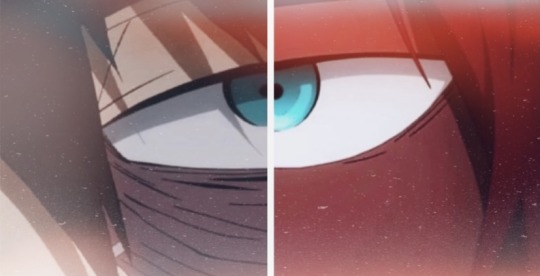
From the start, Endeavor has pitted his own children against each other. Now we’re seeing the complex dynamics of an abusive household, Todoroki Shoto Endeavor’s golden child and Todoroki Toya Endeavor’s scapegoat, play out on a battlefield. At first glance, Shoto looks like the good brother fighting on the side of the heroes, and Toya the bad brother who cares more for plotting villainous revenge than anything else. However, it’s more complicated than that: a look at abusive dynamics and the character foiling between Shoto and Toya underneath the cut.
Before I begin, a brief explanation of the golden child and scapegoat dynamic.
Abuse isn’t just a thing that happens. It’s a power dynamic. The Todoroki Household is considered an abusive household, because all the power is held by one man, Todoroki Enji. An abusive power dynamic can be explained simply as a person who uses the power they have others to their own advantage.
An abusive teacher is someone who steps out of line and acts inappropriately with a student, who they are responsible for because they have power over them. An abusive parent will use their authority as a parent to act in a way that’s not in a child’s best interests.
Abuse is also a cycle. It perpetuates itself. The reason abuse is cyclical is that, in an abusive dnyamic, fights or disturbances can’t resolve in a healthy way so usually things will go back to status quo and power will be held by the abuser again at the end of the disruption.
I’m simplifying here to try to make this as understandable as possible, but abuse is a power dynamic. It comes down to a question of: Who holds power in the household?
In the Todoroki Household, it’s Todoroki Enji who holds all the power.

In a narcicisst’s household, everyone exists to serve the narcissit. This is quite literal in the Todoroki Household. Enji only had children so they could take on his dream of being number one hero and he could live vicariously though them.
Let’s strip away all the fantasy paint in this scenario and define it in more realistic terms. Enji thinks he is entitled to something: the title of number one hero. Enji is unable to handle the feelings of being denied the thing he wants, so instead he sets up a family.
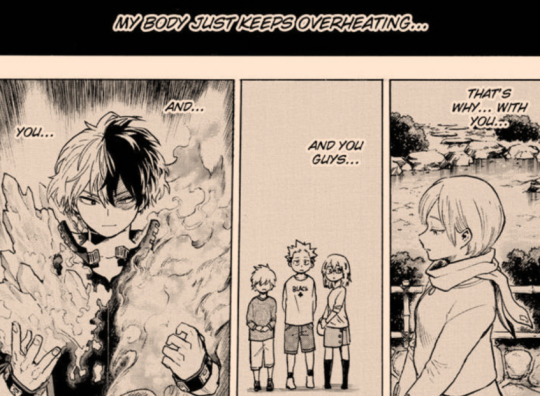
Enji’s family exists for his emotional benefit. He expects his family to “give him something.” He only had a family in the first place, because he thought he was denied what he was owed. Enji had a family for selfish reasons, and thought they existed to fulfill his ambitions, his intention from the start was to use them. So, it’s no wonder more traditional forms of abuse (wife beating, child abuse) rose out of these circumstances. The Todoroki Household is built by Enji, and at the center is Enji a narcissist.
(I do more nuanced takes on Enji’s character in other meta, but this isn’t the time or the place to talk about it here).
The household is centered around Enji, he’s the most powerful person in the house, and he expects the household to give him what he wants. When he’s denied what he wants, he’ll rely on abusive tactics to get it.
There are many types of abuse. Tactics used by abusers include: private criticism leading to doubt and hurt; public criticism leading to shame or humiliation; threats of emotional or physical withdrawal leading to abandonment; withdrawal of money or sexual contact that leads to a devaluation of financial power or decrease in sexual self-esteem; verbal threats that can begin a process of fear; verbal and physical tirades or tantrums (i.e., power displays) that can leave the victim feeling helpless; and finally, physical aggression that can lead to fears of physical death.
In the process of a relationship where a man uses these "tactics" on a woman, any or all can be used in any order, at any time. Usually in the beginning of the relationship, criticism and withdrawal are the two most used tactics that lead the man to have an increased sense of power and control, and the woman to have a decreased sense of power and control. [Source]

Endeavor is denied what he wants. Endeavor gets impatient.He denies that Shoto is even properly in pain, and claims he is just faking it. Endeavor uses physical aggression as an intimidation to get Rei back in line. We also know this happened, Rei fought Endeavor hard for Shoto’s sake at first, but over time became more fragile and more mentally unstable.
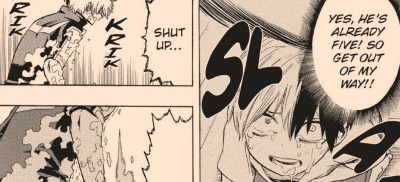
My point is not to detail Endeavor’s abuse because we already know it happened, but to show the underlying motive behind the abuse, abuse is a pwoer dynamic, Endeavor was acting to maintain total authority and control in the household. For the narcicisst everything in the household exists to fulfill the narcicisst’s needs.
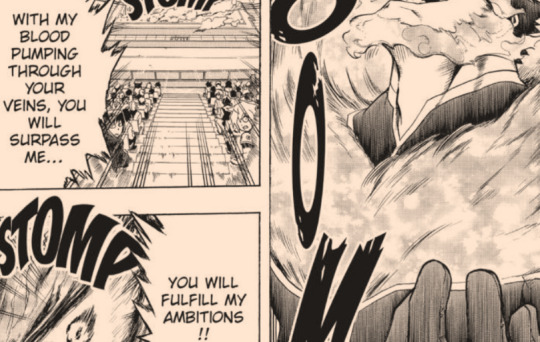
The children as Enji sees them all exist to fulfill his ambitions, so he can live vicariously through them, therefore he doesn’t see their pain. He doesn’t see outside his own ego, because tending to Enji’s needs comes first. He scapegoats one child, ignores the other two, and then the child he does pour his love into he cannot see how much his love and attention is actively harming this child. When Shoto doesn’t want to accept Enji’s attention, he sees Shoto as ungrateful and rebellious. How dare you Shoto, I’m putting all this time and effort into raising you, I’m giving you all of these advantages in life and you don’t repay me????
My point in going into this much detail is that no matter what happens, or how the victims turn on each other in the household, the architect of the abuse, the one who created this situation is Enji. If the victims blame each other, then it benefits Enji because his position at the center will remain unchallenged.
Which is why...
“It’s not better or worse to be the golden child. Both face the psychological whiplash of being raised by a narcissist. The GC becomes the conformer to the extreme, with the intense pressure to measure up, and when they don’t they receive cruelty. The SG becomes the rebel who receives almost constant cruelty and shaming.
The scapegoat and golden child are created because the abuser has a set of impossible to fulfill and aribtrary standards. One of thsee children meets those standards and one of those children does not.
Why divide people up like this, though?
As I said, it’s a power dyanmic. We have already seen this play out in canon once before in the richly detailed telling of the Shimura Household. A household where abuse is taking place will be an unstable environment, because it exists at the whim of an abuser. If there are more than just abuser and victim in the house, people will inevitably notice the fractured mood. This is exactly what happened in the Shimura household, there was a problem that everyone saw but nobody talked about.

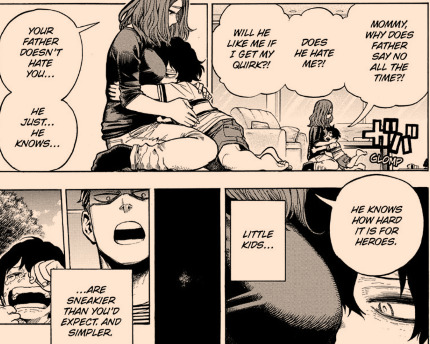
The Shimura household was constantly being disrupted by Kotaro’s abuse on Tenko, however, an abusive dynamic maintains itself by denying the abuse. Rather than confront Kotaro who holds all the power in the household, the weaker Tenko is blamed. This is Tenko’s issue that clings with him all the way until adulthood, instead of just calling his father out for his improper behavior, his family all sided with his father and told Tenko to stop picking fights.
The process will continue as long as the man denies the impact of these tactics on the woman and the woman also denies being victimized. He will deny the impact because of acculturation and insensitivity; [Source.]
Instead of challenging the abuser, the victim is told that it is his fault, he needs to stop provoking the abuser, he needs to stop crying, he needs to stop being so sensitive, the feelings of the abuser are catered to over that of their victim and the dynamic is miantained. By finding a scapegoat to blame for the unrest in the household that is happening because of the abuse, nobody ever challenges the abuse directly.
In other words divide and conquer. If the abuser pits victims against each other, it’s practically guaranteed that nobody will challenge him or confront him on his behavior and he’ll continue uninterrupted. So, in the Todoroki Household where there is a golden child and a scapegoat it continues like this:
So in the family, the Scapegoat and the Golden Child become these roles assigned by the narcissist in order to play the game of Extract Narcissistic Supply through Triangulation.
Triangulation is like driving a wedge between people. Basically, the game involves two or more people who get pitted against each other and usually they don’t even realize what’s happening. They’re just aware of the conflict between each other and there’s always this conflict. [...] The narcissist wants the loyalty of everybody and the narcissist wants everybody fighting amongst themselves. [Source.]
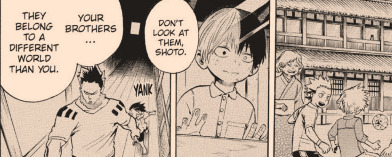
This is why every Dabi fan in the series is saying that Shoto, and Toya were set up to fight against each other, because they were. Enji keeps Shoto separated from his siblings, to maintain control. The scapegoat will blame Shoto for his circumstances believing if they hadn’t been born their fathers attention would be theirs, and the golden child will blame the scapegoat for their rebellion, and their own actions done in reaction to the father’s abuse. HOWEVER. In fighting each other. blaming each other, it is Enji who will escape ultimate blame.
Which is why ultimately scapegoat and golden child don’t really matter, they are both victims of the same abuser. Shoto and Toya are the same in the way they were abused and their reactions to abuse, it’s only circumstances that differ with them.
1. Shoto and Dabi Is the Same
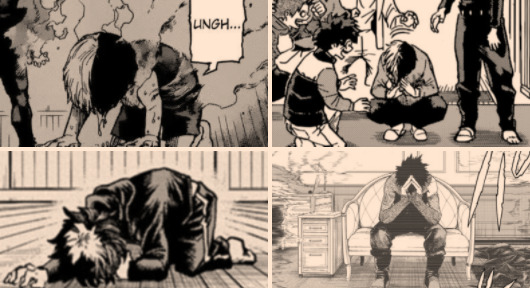
Edit by @miriio
Shoto and Toya are the same, not just because they’re both brothers with the same fire quirk, but because they’ve both been moulded by Enji their entire lives, and their personalities, values, are all in reaction to that. Abuse scars everyone it touches. Arguing about whose scars are worse are besides the point, rather Shoto and Toya mirror each other because they both cope with the stress of abuse in similiar ways, despite their entirely different positions in the household.

In chapter 204 when faced with a foe who won’t give up, Shoto Todoroki flashes back to his father, and begsin to use his fire qiurk.

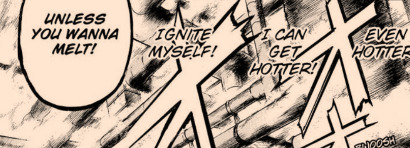
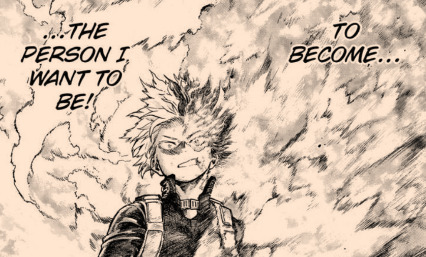
We are shown earlier in this chapter Enji’s attempts to once again assert control over him. Enji texts Shoto multiple times having gone behind his back to get his number. Enji insists that he be the one to teach Shoto prominence burn. (Enji also uses the tactic of understating the past abuse saying he was “misguided” in the past). Shoto while fighting against Tetsu^4 is also fighting against the memory of his father, and uses his flames to his absolute limit in order to prove that they are his flames. He even goes so far to warn Tetsu that he’s not holding back and could cause severe burn damage to his body.
This also mirrors an earlier behavior when Enji pushed Todoroki before his fight with Sero, he overdid his ice quirk to the point of freezing the entire stadium. There’s an idea with Shoto that just because he is starting on the path to healing, and learning to cope healthily, that he never lashes out, or responds to his his father’s violence with violence. That is simply not true.
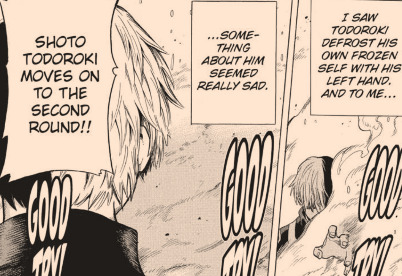
Shoto’s character arc is not complete. He is still dealing with this. As far back as the fight against Class B, he was getting what look to be trauma flashbacks in the middle of the fight, and could have even possibly been triggered by Tetsu’s relentless beating down on him.
Shoto and Toya maintain a similiar pattern of behavior, in that they intentionally are docile, and hold back their strength in a fight. Shoto used to never use his flames at all. He also usually uses them far less effectively than his ice quirk.
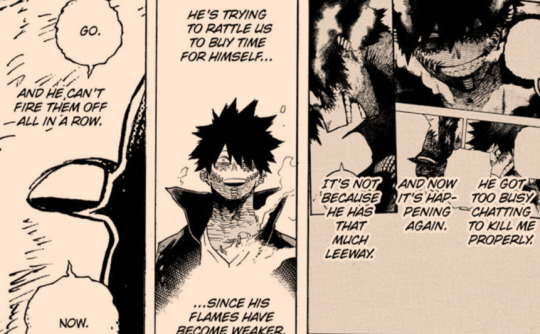
Toya also, uses his flames sparingly in a fight (albeit for different reasons, his flames will burn him as he has no way of cooling himself like Shoto). However, when pushed in the situation, especially emotionally he will go all out. He’ll use the fire with far less regard for who he burns or even for burning himself.

Toya doesn’t use his flames at all, until he does and then he has no sense of moderation.
Besides the way they use their flames, and their bad relationship with their own flames, (Shoto holds them back, Toya is burned by them.) They also both tend to overuse their quirk when they get emotionally riled or are lashing out. Their fire is a metaphor for their emotions, but more on that later.
Shoto and Toya exhibit several behaviors, the similarities are especially strong between Shoto and Earlyroki. First and foremost, they both insist on doing everything alone.


They’re both (Dabi, Earlyroki) highly individualist people who purposefully distance themselves from others, and deny any closeness to others because they need to feel strong on their own.
Shoto and Toya are people who have lived their entire lives fighting their controlling father over agency over their own lives in different ways. Toya fights Endeavor’s rejection of him, and Shoto fights Endeavor’s smothering and insistence that he take his legacy. The reason they cut out everybody else from their lives is because (1: their father dominating and controlling them they never learned to make connections with others, 2: they live their entire lives focusing on battling against their father).
However, the methods they use to fight their father are what their father taught them, because ultimately it’s all they know. Children who are raised in an abusive household grow up improperly. They don’t know healthy means of dealing with their emotions because they are never taught these. Developmentally, they are stunted and this can even have effects late into an adulthood so it doesn’t actually matter that Dabi is in his twenties (especially since he died in his teens).
Shoto, and Dabi are to an extent what their father made them to be. They are staunch individualists, who rely on the strength of their quirk to get what they want, like being the strongest truly is the only thing that matters. This behavior is shown in the both of them, but especially with Earlyroki. There are parallels. The way they both deal with small fry villains.


The scene where they both take out minor villains by entirely dominating them with their quirk is a parallel set up between the two of them.
They also both have a tendency towards dissociation to try to deal with past trauma: IE, trying to move themselves away from their feelings and insist their not feeling anything in order to avoid their feelings.
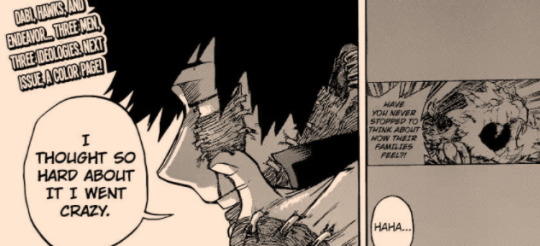

At their worst, Shoto and Toya show off several of the same behaviors. These are all symptoms of abuse. Their shared inability to regulate their own fire is a metaphor for the fact that neither of them were taught how to properly regulate their own emotions.
A healthy adult is able to handle stress, and negative emotions in healthy ways. They can put a lid on it, deal with it at a better time, think and sort through them. Shoto’s emotions always, always, always, come out during a fight even if he insists he’s letting go of the past and his father. Dabi and Shoto show behavior where they are either completely emotionally remote and unreachable “off”, or they are flipped “on” and completely unleash themselves. The point of these states of being is that Toya and Shoto are themselves unstable, because they were not fully developed emotionally, because they did not grow up in a household where their emotional well being was put first and foremost.
They grew up in a household where they catered to Enji’s emotions first and foremost, and because of that both Shoto and Toya have trouble finding themselves in their fire. They also show several other symptoms, dissociation, social isolation, and a belief that they have to be strong and handle everything by themselves. Dabi cannot accept cooperation, and neither could Earlyroki. IN effect, Dabi is still fighting against the idea that he is weak that was beaten into him by his father, so of course relying on others is the sign of that same weakness. They both let their flames burn because they feel the need to be strong.
2. Shoto and Dabi is different
I am making the argument that they are emotionally very similiar, and they both are who they are in reaction to what Endeavor did to them. They just take a different tack in the way they frame themselves. Dabi the villain, Shoto the hero.

Shoto mentions very early on his quirk could be used to kill people, but he won’t, because that’s not a heoric action to do.

Dabi says that he’s killing these villains for a purpose. We learn later what that purpose is, to get his body count up to thirty in order to further stain Endeavor’s name.
In other words, Shoto fights against his father as a hero, Toya fights against his father as a villain. This also reflects the golden child / scape goat dynamic. Shoto on the whole conforms, Dabi on the whole rebels. Shoto is still in the middle of hero society.

Shoto’s strategy has always been that he has to work around Endeavor to get what he wants, which leads to Shoto cooperating with Endeavor on many occasions. He interns with him because he’s the number two hero. He often has his boundaries violated by Endeavor wanting to act like father son in public and Shoto not being comfortable with that.

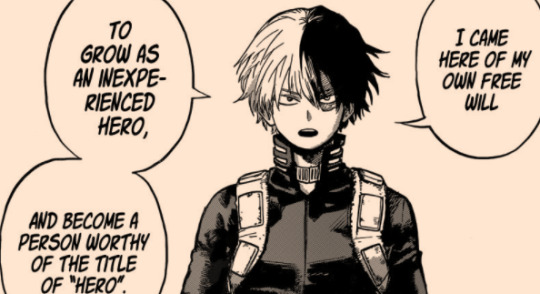
Shoto’s strategy is to exist within the same framework that his father created, but learn to be his own hero. In this strategy he gives Endeavor what he wants almost as a trade for what Shoto still needs, which is practice and training to become a hero on his own terms.
The golden child conforms, the scapegoat rebels. Shoto tries to accomplish what he wants inside of hero society, whereas Dabi pushes his agenda as a villain. Shoto lives to become a true hero, and wants to become a hero for his own reasons not because his father pushed him to, but because All Might inspired him.
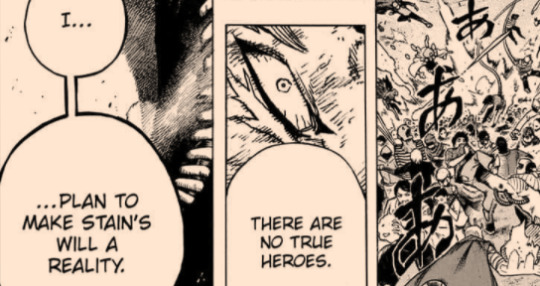
Toya not only declares that there are no true heroes, but he dedicates everything to tearing down what he sees are false heroes. His strategy is one of rebellion. Toya is aware of the arbitrary and hypocritical labels of hero and villain in this society, and because of that goes out of his way to show someone how villainous the actions of a hero can be.
However.
Shoto wanting to become a hero.
Toya becoming a villain from necessity.
Isn’t as black and white as it seems. Toya has what Shoto lacks, which is awareness, the ability to criticize society and the situation he was in. Enji isn’t the only one to blame for the abuse of the Todoroki household, the society that allowed it to happen is also to blame. Shoto is capable of unknowingly inflicting violence on people who are just like him victims of abuse because he lacks Toya’s outside perspective.

Shoto, that kills people.

Shoto, that also kills people.
The point being it easily could have been Dabi that Shoto stabbed to death with an icicle, or burned alive to the point where half of his body was smoking. It could have been Dabi who has the same scars as him, who was burned by the same man. It’s only chance that he was going all out against Shigaraki instead of Dabi. Shoto can’t see villains as victims of the hero system, even though he was a victim of the same system.

Shoto hesitates when he learns that it’s Toya but what is the difference here? He was ready to use lethal force on Shigaraki a moment ago. Has anything truly changed? Dabi is still an enemy trying to destroy hero society. He still kills innocent people. He’s just now a villain that Shoto happens to know personally.
My point is that Shoto’s conformity can set him up against victims of the same society. The same way that, Dabi’s rebellion can lead him to harm his own family.

Dabi’s rebellion is just lashing out. The scapegoat because they are the lowest position in the whole family, because they are isolated, can sometimes associate the abuser’s actions with the whole family. We saw this with little Tenko. Tenko resented both his abuse father, but also his little sister for tattling on him, his mother and grandparents for not comforting him and taking any steps to stop his father. When you are the lowest rung on the ladder, when the stress of the whole household is taken out on you, you tend to see every member of the family as the same.
Dabi absorbs the stress of the whole household. When he inevitably retaliates because nobody can keep that stress inside of them, and Dabi has been taught no healthy means of dealing with that stress, he is pitted against both other members of his family and Endeavor himself.

Dabi’s rebellion will hurt other people in the household, he has no regard for Shoto whatsoever, he sent Ending to Endeavor who ended up kidnapping Natsuo, he also is probably going to cause Rei’s setback.
However, at the same time Dabi’s lashing out is inevitable. Dabi was made to bear the stress of the entire household when he was blame and ousted as the scapegoat instead of his father Endeavor. Dabi is dealing with those emotions alone, lashing out on them alone, he only sees his own pain, but that is because to begin with, and all this time he has been suffering alone.

That’s where we get to the main difference between them, Shoto now has support, and Toya doesn’t.
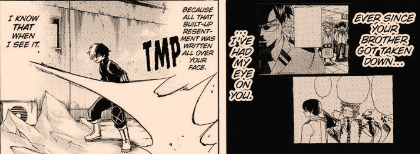
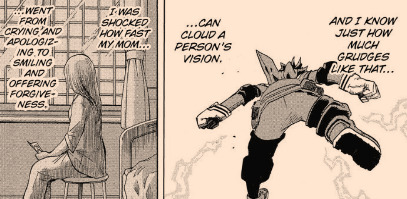
Shoto even says back as early as the stain arc, which is the arc that Dabi first emerged in the aftermath of, that the problem with Earlyroki is not that he was angry, but that he was dealing with that anger all alone. He says it, that being all alone warps your vision, to the point where you can only see yourself.
Dabi is cut off from others, he might care about them but he severs those feelings away from himself. He has been isolated at least since he died, and maybe all his life, and even the connections of the league can’t bridge the gap between himself and others. Dabi is someone stuck in permanent Earlyroki phase because to him he lives his life for one purpose.
Shoto has been allowed to develop as his own person, because he let others in. The biggest difference between them can be illustrated with their fire. Dabi says his flames are Endeavors flames. Shoto is told that his flames are his own.
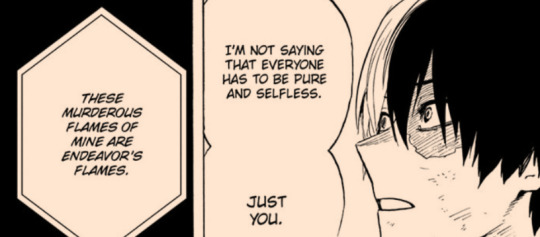
However, Shoto did not reach this consclusion on his own. He was told this by someone else. Shoto could not even take the first step until someone showed him the way, so who is to say the same can’t be true for Dabi?

Dabi has been separated from his family, homeless for ten years, and he literally died that one time. It’s likely that in all that time nobody has told him something so simple as “Your flames can be your own.” Dabi doesn’t know he can have a life outside of revenge against Endeavor because he hasn’t been shown it, he’s only ever known his father’s abuse and his fight against it. We don’t know if the league can reach him or not because he hasn’t been entirely honest with the league until right this second.

There’s a reason that the camera is cut like this.


Shoto’s scar, the damage inflicted on him, and Enji’s unscarred side. It makes a point. Is Dabi really the enemy in this situation? Is Dabi the ultimate villain? He plays the mastermind but he’s not.
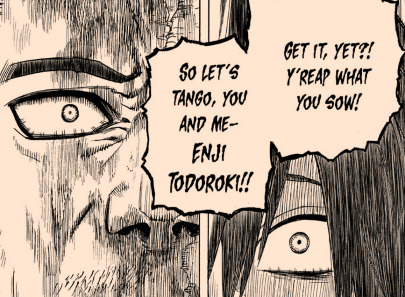
Both Dabi and Shoto were burned by Endavor’s flames. It was Endeavor who created the situation and pitted them against each other in the first place. Which is why hero or villain, golden child or scapegoat it honestly, should not matter. Dabi and Shoto are not each other’s enemies, they were just made to think that way by Endeavor’s actions all the way back from when they were kids.
If Dabi is blamed for his own rebellion. If he’s villified for it. If Dabi is made out to be the bad one for reacting the way he did, then, it’s no longer Enji’s fault for abusing him in the first place. After all, Natsuo, Fuyumi, and Shoto were similiarly abused and they didn’t react that way. Maybe Dabi just had bad vibes. If Dabi and Shoto are fighting each other, neither of them are fighting Enji, and the society he represents which enabled Enji’s abuse. While victims blame each other for their own reactions they don’t confront the abuser.
Endeavor burned them, and Shoto, and Dabi are coping with those lifelong burns in different ways. Instead of trying to kill each other, they have much more to gain from sympathizing with one another. Shoto’s path to become a hero and surpassing his father, should take the course of being a hero who rescues. We’re even shown in this arc how horribly violent Enji is towards Shigaraki, a victim of similiar abuse to Shoto. Shoto would become a better hero, from listening to Dabi’s perspective and learning about the flaws in hero society. Whereas, Dabi needs to learn that he has a future beyond dragging his father to hell with him. Shoto was only able to open up to other people because someone forced their way through his walls and told him that his flame was his own, and Shoto can be the one to open Dabi’s eyes that his flame can be used for more than just destruction.
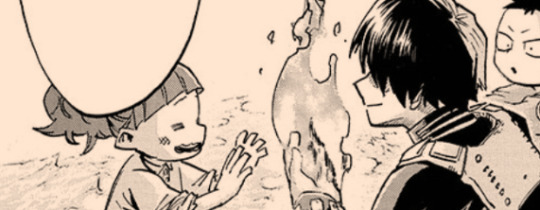
Shoto’s desire for a hero is not wrong, Dabi’s desire to confront Endeavor’s abuse is not wrong. Both of these things are necessary. To make a person stop behaving badly you have to confront them about your behavior. However, it’s not healthy to linger in your pain forever because you won’t be able to move on and heal.
Shoto is someone who can tell the all important words to Dabi. Your flames are your own. Didn’t you want to be a hero?
PS. It’s really hypocritical to say that Dabi is wrong for announcing what Enji did on public television, like... Shoto tells his backstory to literally anyone who asks. Fuyumi casually discusses the fact that Natsuo thinks their father killed their brother with Shoto’s two friends from school. THEY ARE ALL LIKE THAT. THE TODOROKIS WILL TALK ABOUT THEIR DRAMA IN FRONT OF ANYBODY.
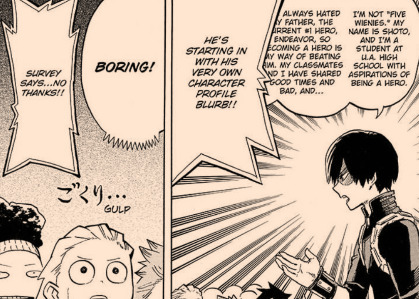
#mha meta#todoroki shoto#todoroki toya#todoroki shouto#todoroki touya#touya todoroki#shouto todoroki#dabi#shoto todoroki#todoroki family#tw: abuse#fuyumi todoroki#natsuo todoroki#rei todoroki#character foils#shoto dabi foils#todoroki dabi foils#todoroki dabi#dabi todoroki#my hero academia meta#my hero academia theory#my hero academia analysis#my hero academia character analysis#bnha 290#mha 290#bnha spoilers#mha spoilers
679 notes
·
View notes
Text
Jason Todd is the Anti-Batman
* A pointless rambling of the relationship and parallels between Bruce Wayne and Jason Todd.
Picture this opening scene: There are two boys in a dark alley.
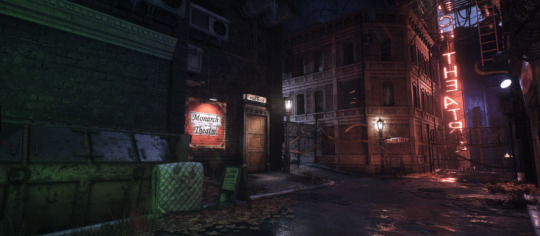
One is dressed in an expensive suit with a tie his dead father helped him with only earlier that evening. His hands are stained red with the same blood now puddled on the grimy cement. His face is in shock.
The second boy is dressed in tattered jeans and hoodie. His hands are stained with tires grease and are clutching a tire iron. His face is in shock.
Decades later, there are two more scenes to consider.
A seriously injured man sits slumped over in his father’s study. Without warning, a bat crashes through the window, and everything falls into place. He now knows what he needs to do.
Elsewhere, an emotionally distraught teenager is curled up into a fetal position on a hotel room floor. Heart wrenching cries can be heard from him. But it is only momentary. He now knows what he needs to do.
These two individuals are Bruce Wayne and Jason Todd. While they are both broken and determined men, Batman is a hero. The Red Hood is not. He is the anti-Batman and this is why.
Two Boys in an Alleyway
Despite similarities in their stories’ early themes and elements, Bruce and Jason came to walk down very different paths. One of justice, and the other vengeance. Batman is determined to protect the innocent and Jason more so on punishing the guilty. Both their ideologies have intrinsic flaws, of course, and will naturally clash often. But this wasn’t always the case.
Before they became a father and son perpetually in mourning for who they once were and what could have been, Bruce and Jason were remarkably similar. The two are cut from the same cloth and Bruce knows this better than anyone else.
In the Dumpster Slasher three-part story line, (Batman #414, #421, #422) Bruce becomes emotional. Violent. He sits in the batcave alone that night and contemplates his emotions.
“Nearly blew it. I let it get too personal. Lost my detachment...nearly lost control. Almost beat Cutter to death. Wouldn’t have been any big loss.”

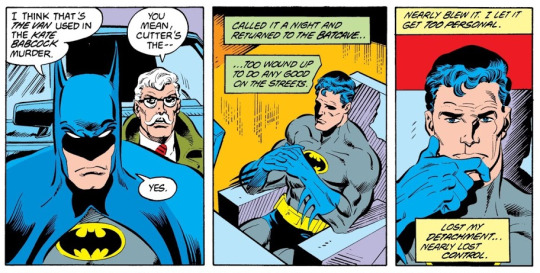
Only one issue later, at the end of this story arc, Robin is out on the streets and becomes angry when he happens upon a pimp is threatening a prostitute with a knife. Now, I want you to compare his line here to Bruce’s and note what Jim Gordon said to him as well.
Batman: "I think he’s had enough, Robin. What were you trying to do, kill him?"
Robin (Jason): “Would it’ve been that big of a loss if I had?”
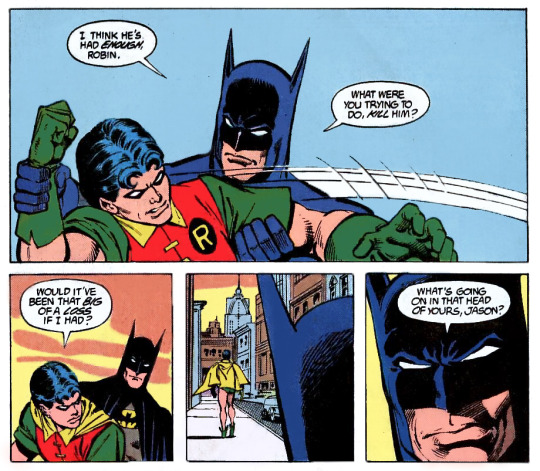
It is important to note here that Batman is not worried or upset just because Jason roughs up a pimp. That would be hypocritical considering his own earlier actions. If anything, it’s because one of the main reasons Batman even takes in these kids, these ‘robins,’ is because he doesn’t want them to be like him.
And Jason was acting just like him.
Jason can and has screwed up and failed due to his own actions, but it was never the reason Batman became upset with him. His reactions in the comics when Jason does things like running ahead and ‘jumping the gun,’ are more like this:

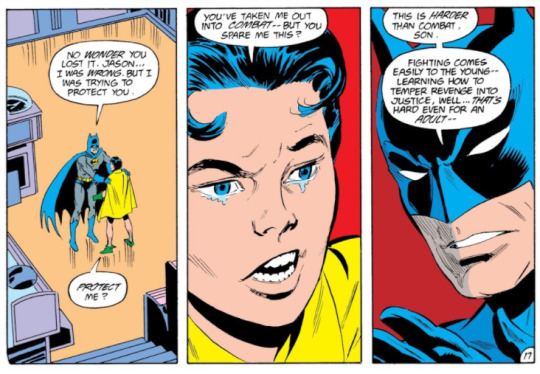
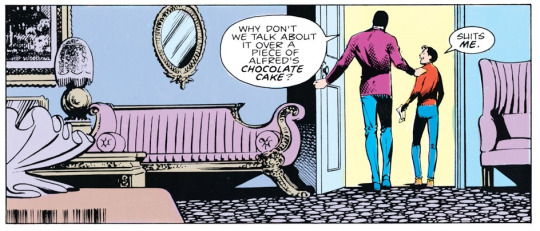

He either makes a teaching moment out of it or is attempts to understand Jason’s reasons in doing any such thing. When Bruce does become harsh in his discipline, it’s either when he feels as though Jason has endangered his own life or as I said, he acts too much like him.
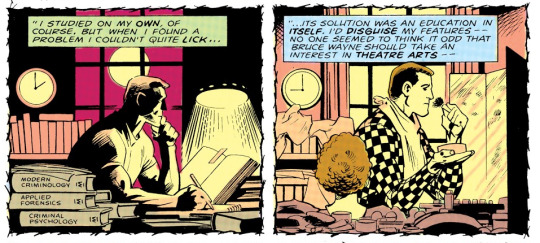

While there are quite a few more similarities between Bruce and Jason that makes them alike, such as both being introverted and interested in obtaining all sorts of knowledge that they might not even feel is relevant, they are both, at the core of their characters, deeply caring and compassionate people.
The differences only start to show with how they act on it.
The Not-So Dynamic Duo?
“What happened to you as a child, the terror, the pain, the horrors (...) you were broken, and I thought I could put the pieces back together. I thought I could do for you what could never be done for me. Make you whole.”
Hot take. Jason Todd is a villain and is best written as a villain.
Not in that campy way like he’s written during Dick and Damian’s Batman and Robin run while wearing that stupid pill-headed hood, (although, I grant he has a few lines that are enjoyable to read) but in all his serious, vengeful and downright brutal motives.
The Red Hood is the perfect Batman villain because he’s so different from what the widely perceived perfect foil to the controlled and disciplined Bat is...the Joker.
The Red Hood was vengeance at its purest. It is justice without being tempered by mercy. It is the rage of victims who were forgotten to become statistics. While other vigilantes wait for a cure, hope for rehabilitation, and pretend their system works, the Red Hood is a man of no such faith.
And this makes him a villain. And a damn good one.
During the Red Hood’s time as a crime lord in Gotham, he goes around blowing up buildings. He throws grenades into trucks. He mows down his competition with gunfire. Batman comes upon the bloodied hanged corpse of a man he was finished interrogating.
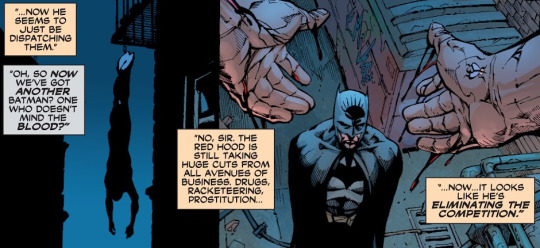
But what is so compelling about this all is that before all the murder, all the guns and explosions, Jason Todd was a very different little boy. And all the great and memorable villains start that way.
The Joker is not someone you’re meant to sympathize with or even understand. In fact, I find him more terrifying because he’s unknown. He has no backstory (unless you want to believe the one he gave in Killing Joke, but the clown has a new story for every face he meets) and seemingly does what he does for a laugh of all things.
Jason Todd is in pain. He’s traumatized. Betrayed. Buried. Replaced. He is no one’s son because his father abandoned him.
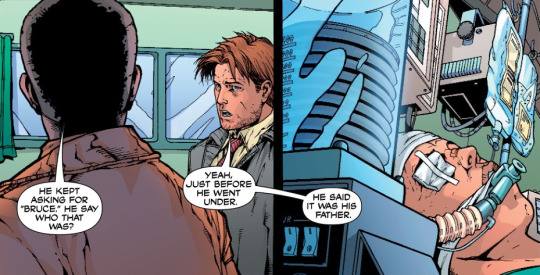
Once upon a time, Jason Todd was a boy who saved himself. One of the biggest lies that Batman himself perpetuates is that he saved Jason from a life of crime. He tells Alfred that Jason was always dangerous. Bruce simply took him off the streets before he could be any worse.
But I don’t believe that’s true.
Jason grew up surrounded by crime, poverty, substance abuse and yet this amazing kid saved himself everyday by making a conscious choice to be kind and care about school, care about keeping his mother alive for over a year when he was just a child himself. That amazing kid was magic.
Jason Todd as Robin was magic.
“Jason smiles. A bright smile. The kind Robin, the Boy Wonder should have.”
A good portion of his character’s assassination was in order to push the Tim is the perfect Robin idea. It was editorial decisions. The same ‘suits’ who insisted that Tim Drake be the Robin in the New Adventures cartoon despite having Jason’s backstory and personality. But I digress on that.
Jason Todd was an introverted, studious, and emphatic person. He wanted to make friends with other kids his age even though he was a loner at heart. He joined the school baseball team and was a class officer, even if his training kept him from most social interactions.
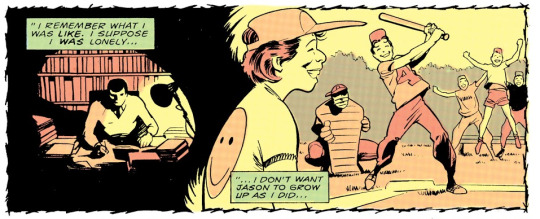
He was also very much in tune with non-verbal cues and small changes in the environment around him. He was a thoughtful person who could be found admiring the stars or passing by scenery. When he teams up with the New Teen Titans, we get to see these aspects of his personality:
“I don’t think I’ve ever seen anything so beautiful before. We’re actually riding above the clouds.”
“Every so often, I notice you become awfully agitated...like something was going on you didn’t want to be part of. Something’s wrong, isn’t it?”
It didn’t take Bruce long to fall in love with this boy and ask to legally adopt him. He found him to be smart, thoughtful, quick at learning and funny as hell. Their first meeting opens with Batman laughing in the very same alley his heart was ripped out decades earlier.
Even in the Rebirth canon, (RHATO #48) we see that Bruce is already set on taking in Jason while he’s still with Ma Gunn’s school. He likes this kid. A lot.
“Butler, actually. You’ll meet him someday, I’m sure.”

Jason Todd was happy. Most of the time. Unfortunately, he still wrestled with depression and would sleep all day on occasion and could be found crying hidden away on his own, withdrawn from the concerned Bruce and Alfred.

In A Death in the Family, Alfred and Bruce sit down and discuss Jason’s worsening mental health, particularly after the Diplomat’s Son where Jason becomes witness to sexual assault, suicide and the failings of both Batman and the GCPD to protect innocent people. Barbara, his tutor, someone he cared about and got along with, is also shot a few months earlier.
Bruce thinks Jason has become suicidal. Alfred does not disagree with this theory and supplements it with things he’s observed himself about the ‘lad.’
“I’ve come upon him, several times, looking at that battered old photograph of his mother and father, crying. When he’s seen me, he’s hidden the picture and left the room, refusing to talk.”
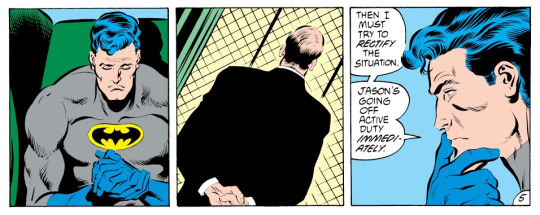
It is then that Jason discovers the truth about his mother at the worst possible time, when he’s not even thinking straight, and thus leads way to the tragedy that will be his murder at the hand’s of the Joker.
The Curse of Jason Todd
“Do you have any idea what you have done?! Do you? You have no inkling of what you’ve created -- what you have unleashed! You have set free a curse upon this world!”
Red Hood: Lost Days, which depicts Jason’s dark post-resurrection origin, opens with Ra’s al Ghul bellowing this line, the steam from the Lazarus Pit still rising off of him.
I’m not going to analyze this line, I’m just using it to supplement a point of mine I hope I’m getting through well enough. The Red Hood is a compelling, tragic villain. He is similar to Batman in ways that Bruce always knew and may have even feared because of how intimately he knows his own deepest, darkest thoughts. Jason is the perfect foil as an antagonist for him because of what he represents to Bruce.
And it’s not his anger, or his rage, or even his brutality.
It’s his compassion. His caring. His emotions. And how they can open up the worst parts of themselves.
Both are motivated by preventing whatever trauma happened to them from ever happening to anyone else. They both trained for years with this motivation. And they’ve both acted out on the very person who inflicted their trauma onto them.
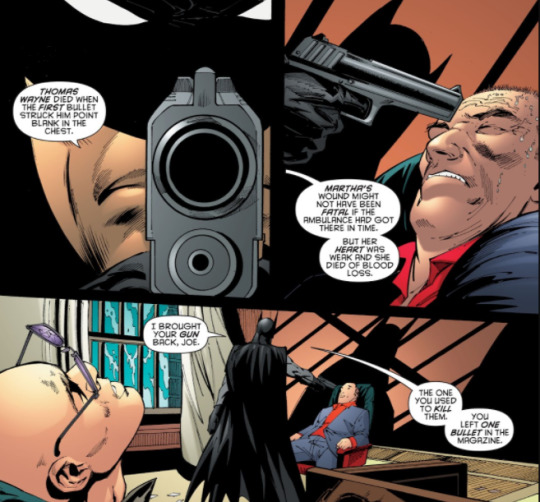
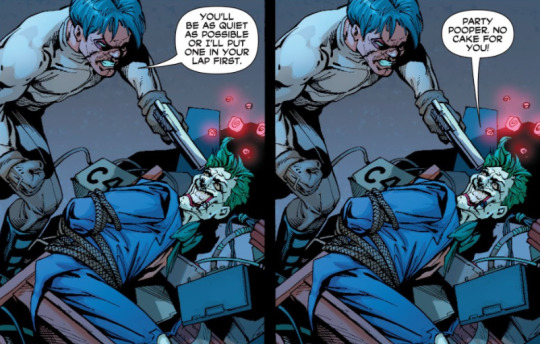
Here’s where their paths start to differ, however, and what separates them with a line of morality.
They both get angry. They both care so damn much. About Gotham, about innocents, about each other. They both get too emotionally invested and deal with consequences related to that. To manage with that, Bruce shuts down. He creates all these choices, rules and symbols. He uses every ounce of his self control to keep them.
Bruce Wayne is not a good person. He forces himself to be with discipline and will. He chooses to be a good man and constantly pushes himself to live up to that. Because it’d be too damn easy to be just like the Red Hood.
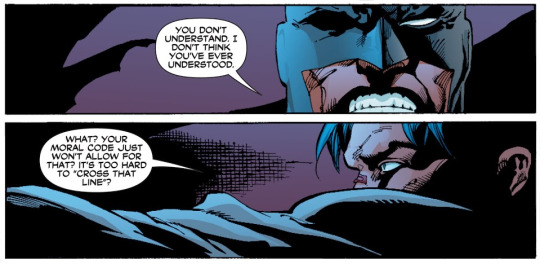
Jason doesn’t understand that. Because no matter what Bruce had done or will do, he doesn’t hate him. He can’t. Despite his denial of the fact to different people, he still thinks of Bruce as his father. This great figure that so many others revere and are even intimidated by.
He’s not the only bat-kid to think of Bruce in this light despite the fact that the man is not. It took Dick years to overcome that perception. Tim only just started to begin understanding this true nature after his own father was murdered.
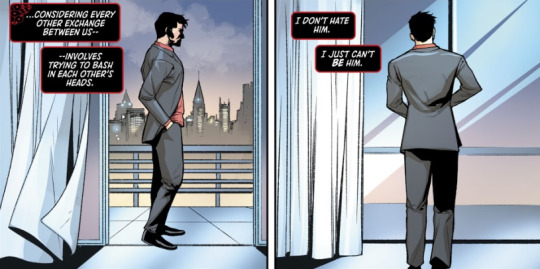
But even if he did understand his (once)father, he still became the complete opposite of him despite so many early parallels. He doesn’t hold back his words and emotions, he doesn’t go into a state of controlled dissociation or emotional disengagement.
Jason Todd—the Red Hood—is Batman without all his rules and control. In a way, he’s what the darkest part of Batman himself wants to be. Jason does what Batman can’t do when it’s needed.
Because in Batman’s book, life beats out justice. Even if he could take down abusers and murderers, he won’t. He will choose saving and protecting lives over the apprehension of killers...he always does.
Batman is justice. Red Hood is vengeance.
Jason is a victim’s fantasy. He punishes and kills the guilty. Something Batman won’t do.
He is the anti-Batman for better or for worse.
200 notes
·
View notes
Note
Hello! I have always believed that Michael needed better doctors and good treatment. He was simply billed as "Evil". Sometimes I think that at that time they were unaware or ignorant of mental illness, and that is why Michael did not recover. I wish it had been treated better. I would like to know your opinion about it ;v;
Oh, absolutely. Michael is a very tragic character, and what happened to him was almost entirely Loomis’ fault, secondarily the system and his parents’, and like onyl 0.8% his own. It’s true that mental health aid has historically been really bad in most places, and even today treatment and acceptance—even in specifically medical settings—tend to be abysmal. Of course people knew less than they do now about how psychological stuff works, but bias, cruelty, and superstition as well as a system that enables and even to degrees outright encourages that is to blame for the awful treatment people woth mental illnesses and personality disorders faced and continue to face, not just a lack of knowledge, and the history is really heavy and awful to look over. : ( It’s horrific some of the things doctors have done and do to people just trying to get help.
Like, in Michael’s case, we’ve had a name and understanding of psychosis since the 1800s. Canonically, by the time the poor kid was six years old, he was hearing voices telling him to do bad things to people. He told his parents, seeking help, and they did nothing to help him—just told him it was his imagination—despite knowing hos grandfather had suffered the same symptoms. If they had only taken him seriously and given him therapy and possibly medication too, Judith never would have died. (I am not goong to say it every time, but all this information is official canon) Michael’s reason for killing his family members is wanting the vocies talking to him to be quiet, because it’s agonizing. If you’ve ever had intrusive thoughts (stuff like “pull into oncoming traffic” or “break that and see what happens” and such that don’t actually compell or force you to do it at all, and are always things you as a person deeply do not want to do, but nevertheless are really annoying or distressing to hear in your head), imagine that cranked up to 1000, endless and constant, but from voices that seem to come from around you instead of in your head. Especially as a young child, with no understanding what is happening to you, this would be incredibly scary and distressing—doubly so when dismissed by your parents, whose sole job is supposed to be to love and protect you.
The voices say they’ll be quiet if Michael kills Judith, so Halloween night, he does. Important to note here Michael is recently six years old at the time, which developmental psych literally is not old enough to have a complete understanding what death itself is, let alone complex morality. You /cannot/ be evil at six, you simply don’t have a complex enough understanding of right and wrong or of consequence to /be/ evil. Also at this age, usually kids see death as a vague concept, but one that applies to people they don’t know only, not to them and their loved ones. In Halloween 1978, immediately after stabbing Judith, Michael looks away while he keeps doing it, and his breathing speeds up in a scared way. He barely looks at the body, and immediately goes down stairs to wait for his parents—probably for them to fix it—and does nothing to flee or hide what he’s done. He looks traumatized when they take his mask off. (Lots of little notes here like that Judith when she sees him seems annoyed but not very, and when he attacks her, tries to shield herself and call to him to stop, rather than fleeing or fighting back, which [appealing instead of fight or flight] is pretty exclusively something you only would use if attcked by someone you are on good terms with—I mean, Michael is six—if Judith had /tried/ to fight back, no way she would have died—so there’s less than nothing to indicate they had anything but a loving familial sibling relationship. But if I list all these I’m gonna launch into my six page Michael Myers meta so I will speed through the rest.)
Anyway! Sorry, I have many feelings. About...everything. Including Michael for sure. So, immediately after killing Judith, Michael stops talking. He also shows other psychosis and trauma readily recognized side effects, like catatonia, slowed movement. In Halloween 1978c Dr. Loomis claims he tried to treat Michael for eight years, then spent another seven trying to keep him locked up because he realized he was evil. This is a /blatant/ lie, as in film canon Loomis, by Michael’s review hearing I believe four months in? Six or less for sure, I believe it is four. Loomis has /already/ become convinced Michael is a demon in human form, faking his symptoms, and itching to kill again. The other doctors think Loomis is crazy, as does the other doctor who examines Michael, but they’re awful people so they let him stay Michael’s doctor anyway, even though they refuse to move him to Litchfield maximum security. By this time only a few months in, Loomis is canonically also threatening the six year old in his care and constantly telling him he is an evil being who wants to get out and terrorize again. (Also, I will die enraged the sentance Michael gets for killing Judith is to remain locked in solitary in a sanitorium for /15/ years, until he turns 21, at which point he will be tried as an adult for murder??? The fuck?? You CANNOT charge a 6 year old’s crime in adult court! ‘Tried as an adult’ is meant for like, when a 17 year old dismembers their family and eats them! It’s for particularly heinous crimes, committed by someone /very/ close to being legally an adult, and that /only/. The idea of waiting fifteen years to try someone as an adult for something done at age six is laughable and sick).
Okay this is already long, I get carried away rip. Uhhh, anyway, yeah. In Smith’s Grove, Michael is visited by mom and Laurie once, then never sees any of his family again, because his dad hates him and forbids the others—finds out because Laurie is four and talks that they went /one/ time, and physically beats four year old Laurie for mentioning his name until she trauma blocks out ever having had a brother. From then on, Michael spends /fifteen/ years and all the dest of his developmental stages of childhood in a sanitorium with Dr. Loomis—a man who on wild religious superstition grounds assumes by his own admission /on sight/ that Michael is evil, and no other human contact. According to canon, Michael spends at least four hours of /every/ day with Loomis, his /only/ human contact, who threatens him, promises to stop him, and endlessly barrages him with “You’re evil, you’re not human, you want to kill again, I /will/ stop you,” and nothing else. He also canonically keeps Michael overdosed on a type of antipsychotic that, while a fine drug if used normally, if overdosed can deeply worsen symptoms, and can cause permanent brain damage.
Honestly, if a six year old is exposed yo major trauma, none of their issues are explained, legitimized, or believed, and almost all of their developmental stage is spent with endless voices they don’t know the cause of suggesting murder and violence, one human being and authority figure telling them over and over and over for fifteen years with no other constant in their life or human contact period that they are a demon in human form who wants to kill and is /going/ to do so again...? How else was that story ever going to end? I’ve said it before, but that’s beyond conditioning; it’s lab growing a human child to one day walk out and murder Laurie Strode with a large kitchen knife.
I stand by Halloween is a greek tragedy more than a slasher, and Michael and Laurie are both victims. He’s the Asterios, she’s the Ariadne. Loomis the Minos, the real villain. (Or the Poseidon choose your poison).
Anyway, I 100% agree! If he had just gotten help from his parents, Judith would have never died. If he’d had good doctors, none of the events of 1978 would have come to pass, or anything after it. Loomis single-handedly causes the deaths in 1978 himself through years of cruelty, and bigoted bias towards a small child in his care who needed his help, not his abuse, but he chose to break as much as he possibly could despite his responsibilities as a doctor, an adult, and a human.
If you’re interested, I did a canon-deep-dive character study short story on Michael on AO3! Halloween is such a sad story but it’s fascinating. God, poor Michael and Laurie deserved so much better than they got. It’s a testament to Michael’s character that even after 15 years of Dr. Loomis, he really only kills his intented target(s) in search of quiet from the voices, and anyone who sees him/would be a threat, and not other people. Makes no attempt to kill any of the kids in Halloween 2018, and only kills Bob when he literally opens the door to his hiding spot and Michael is found and Bob becomes a threat to him. In H20, after Michael has had 20 years on his own, you get arguably the least brutal Michael, who intentionally passes on killing the mother and child, and the security guard he walks right past, because they don’t see him and thus he doesn’t /have/ to. Halloween II is less intentionally avoiding, but even then he still does the same multiple times too, like with the old lady making a sandwich, or the scene in the incubator room. Anyway he desevered better fuck Loomis all my homies hate Loomis.
#ask#anonymous#michael myers#halloween#halloween 1978#halloween II#Halloween H20#Halloween 2018#note: Michael is written /very/ differenly in the different timelines. different writers took complrtely dofferent approaches to hin as a#person. and his motives. so unless I state otherwise I am always talking exclusively about the version of Michael from the H20. 2018. & DbD#timelines. since those are all largely the same character. unlike the 3-4 RZ and resusrection or the novelization etc#they’re seperate universes w different canons. i am only really interedted in core/OG canon and its offshoots#its /direct/ offshoots haha#laurie strode#sam loomis#Isolation (fic)#Isolation#meta#michael myers meta#long post#me: I am not gonna do the six page breakdown ima do an overview#me: doesn’t do the six pages but damn well doesn’t do the short version either#i can’t help it you found an intense passion topic
68 notes
·
View notes
Text
Why you should watch RWBY
TL;DR:
Summary: RWBY is an epic fantasy with themes like found family, the struggle to remain hopeful, the younger generation growing up, villain redemption, and systemic evils.
Strengths: RWBY has unique and memorable characters. The show is smart. It has excellent cinematography and animation. It has representation. It tackles hard topics. It’s got incredible music and it’s free on RT’s website.
Weaknesses: RWBY has some early growing pains, specifically volume 2’s finale, as well as budget and polish. Later on, volume 4 is weaker than the rest. Volume 8's finale is extremely distressing for a lot of viewers (and we haven't seen the follow up to those events yet). The fandom can be bad at times.
Misinformation: The early volumes being bad, the racism plot line, and the animation (not the same as “budget and polish”) are not as bad as you may have heard from YouTube.
Suggested viewing order
Red Trailer, White Trailer, Black Trailer, Yellow Trailer
Volume 1
Volume 2
Volume 3
Volume 4 Character Short
Volume 4
Volume 5 Weiss Character Short, Volume 5 Blake Character Short, Volume 5 Yang Character Short
Volume 5
Volume 6 Adam Character Short
Volume 6
Volume 7
Volume 8
(I did my best to make this spoiler-free. When there are spoilers, they’re worded ambiguously enough that someone new to the show would never guess what’s going to happen just by reading this.)
What to expect
The world of Remnant is filled with monsters called the creatures of Grimm. Warriors called Huntsmen and Huntresses defend humanity. Ruby, Weiss, Blake, and Yang go to school to become the next generation of heroes. Together they make Team RWBY (pronounced, “Ruby”)! Joining them is team JNPR (“Juniper”), made up of Jaune, Nora, Pyrrha, and Ren. But evils even more dangerous than the Grimm are ready to make their move, and school quickly becomes an afterthought…
(I mention these next two topics specifically bc they can immediately turn someone away based on bad expectations.) There is a fantasy school setting, but RWBY is not a show about school. School topics are not a dominant idea: it seems to resemble a setting like Harry Potter, but the actual focus of the show rarely touches on things like classes or homework or tests, and we quickly move on. There is romance and it has a role in the plot, but RWBY is not a romance show. On the scale of romance in FMAB to She-Ra, RWBY falls somewhere in the middle.
What is RWBY about, then? RWBY is like an epic fantasy or high fantasy, despite first appearances. Perhaps not every genre convention is followed, but at its core, RWBY is about an epic struggle of good and evil.
RWBY contains themes such as found family, the struggle to remain hopeful, the younger generation growing up, villain redemption, and systemic evils.
Strengths of the show
The characters are unique and memorable. One of the cool things is that they all draw inspiration from a real life fairy tale, myth, or something else. They designs are all top notch. One character who died with extremely little screen time even got so much fandom love, they included the character in a mid-hiatus short later. The characters have unique weapons, too; in the world of Remnant, a weapon is an extension of ones’ soul, and they reflect the variety of their owners. They’re also just plain cool; Monty was famous for following the “Rule of Cool.” And their individual stories are all compelling and interesting.
The show is smart. As a fandom, we generally pick up on the narrative hints the creators are dropping. And our predictions usually come true, but not in a way that makes the show predictable and boring. We very rarely guess exactly what will happen, but we have some similar idea of it. It’s just excellent foreshadowing.
RWBY also likes to play with tropes, as an extension of this. Often it will challenge them, or subvert expectations. In other cases, RWBY uses tropes to avoid showing us what we already know will happen. This occurs in both characters and plot. For example…
SLIGHT SPOILERS FOR VOLUME ONE FOR THE REST OF THIS PARAGRAPH: Jaune’s entire character arc is about trying to be the anime protagonist, and learning that he doesn’t have to do things alone, and it’s ok to be a support main. The show sets up the narrative in a way that looks like, oh of course the direction it will go is him becoming the main character, but then it destroys toxic masculinity instead.
Our characters are smart, too. Plot-induced stupidity generally doesn’t happen. (A few big mistakes or errors in this regard aren’t actually the fault of the narrative, either, but animation and miscommunication and failure to execute. And those aren’t common.) It goes beyond just “not being dumb,” however. The villains’ plans are incredibly clever, and our heroes sometimes even guess at the usual “plot twists.”
The cinematography is just incredible. There are numerous freeze frames with extreme attention to detail that reveal character motivations or arcs or foreshadowing, there are many effective cuts and moving parts, there are soooo many parallels and callbacks, and visual cues such as lighting and color all are used appropriately to convey emotion and assist the narrative. It is one of the biggest overlooked strengths of the show, imo, simply because a lot of people in the fandom don’t notice these things as much for whatever reason, or else don’t give as much praise about them.
The animation is extremely good as well. Budget issues and technology issues aside (which means a lack of polish), the actual animation? The fight choreography, and all the other parts of animation that aren’t just “expensive CGI” are all wonderful. You can have very shiny, polished turds after all, and RWBY is like the opposite: not very polished, especially early on, but very well animated. All the trailers, volume 1 episode 8, the volume 1 finale, the volume 2 penultimate episode, and basically everything else hold up extremely well even today. If anything, the worst fight animation was in volumes 4 and 5 because of Maya growing pains, and those are an example of being more polished, but not necessarily better animated. Animation of faces has always been good, animation of characters has always felt lively. Aside from a few small actual hiccups (that one person running across rooftops for instance), it’s well done.
There are LGBTQ+ characters. The treatment of one of the recent trans characters, in volume 8, was nothing short of amazing. They worked with a VA who was trans. The moment of canon confirmation was important to the character for backstory, because of course that affects the character’s life, but not the only important thing about the character. The representation is not in-your-face or pandering. And there is a split of representation among the main cast and the minor characters, with promises of more to come (notably they’ve said they’re working on more mlm for future volumes, too).
RWBY is not afraid to tackle hard topics. It deals with things like mental illness, systematic racism, and cycles of abuse. It’s not because the show is trying to earn “gritty and dark” points, it’s because those are some of the topics that real people have to struggle with as well. And the show handles most or all of them very well, in a way that shows respect and an honest attempt to depict these things as best they can. (NOTE ABOUT VOLUME 8: THERE IS A VERY DIFFUCLT CONVERSATION CURRENTLY HAPPENING. I am on the side of, let’s wait and see what happens next because the story isn’t over, so we haven’t really seen the fall out. But I understand why this paragraph feels really difficult to agree with if you've seen the volume 8 finale. I trust the track record of the rest of the show, personally.)
As an example, the show has a theme that villains are rarely evil just because. A lot of villains choose to do bad things because they were hurt in some way. Some lived in poverty; some were hurt by racism; many of them are victims of abuse. But the show doesn’t make excuses for them. It’s possible to be both sympathetic and still choose evil over and over again (that’s called tragic). The ones who eventually do try to do good again are not always forgiven, either.
The music is amazing. I can probably count on my hands the number of times I’ve heard someone say otherwise, which is astonishing when you consider this fandom.
It’s also free on RT’s website. (A paid, “FIRST” subscription removes ads and lets you see new episodes one week early, but they all eventually release for free.)
Weaknesses of the show
Early volumes’ growing pains exist, much like most or all other shows. (Even some of the greatest were not immune to this, like ATLA.) In this case, however, it’s a little bit rougher. A large reason why is that this was kind of the first big thing from RT to ever come out. If you remember back almost a decade ago, their only other big thing at the time was RvB, which was machinima. They pretty much started from scratch with everything, from assets to VAs to animation to writing. Imagine if a random twitch streamer, like Ninja (idk who’s popular these days) said one day, “OK let me just direct something that’s intended to be the next great movie series of all time, like Star Wars, with a $4 bill and an iPhone camera.” Then went out and actually made something. Of course it would be rough…but then it turns out the movie is actually really good. And then you get to watch over the next several years as everything gets better and better until it’s honest-to-god comparable to the MCU. That’s kind of what happened with RWBY.
One specific growing pain was the volume 2 finale. Pretty much everything else up until that point, I love about the show. But the finale just fails to deliver on the build up of tension from other episodes. Some of it is because of later plot developments that we didn’t know at the time; some of it is because of just not great writing; some of it is because of just not great animation; and yes, some of it is budget. Regardless, it’s a low point for the show.
Speaking of, the budget for the early volumes is super small. The infamous volume one shadow people, the infamous person jumping across the rooftops in volume two, and just production quality isn’t high compared to a major release from some established studio. These are real weaknesses of the show that for some people, make it unwatchable, and if that’s you, that’s ok.
One last weakness of the show, the screen time per episode, especially early on, is NOT a full 20 minutes like you may expect of an anime (or anime-inspired-western-media, for those of you who will die on the “RWBY is not an anime” hill). This is a trend that has stuck with the show, a shorter run time per episode, for generally the entire lifetime. On one hand, it means it’s a little less daunting to catch up or rewatch than the number of episodes might imply. On the other, early on, some episodes have a little weird pacing. It also means the writing had to adjust for this, so while RWBY got really good at telling a story within a shorter amount of time, there’s also challenges with that too. Perhaps one of the notable ones is the pacing, with slower moments sometimes feeling like it takes up too much screen time, or not enough. Volume 4 was a particular struggle for the crew, both because they switched animation engines and also for the story.
Common complaints that I don’t agree with
I don’t agree that the early volumes were actually bad overall. Growing pains, yes, but not bad. I attribute that complaint to overly focusing on one character’s storyline, back when it wasn’t clear there was so much more to come and before people realized the show would challenge the tropes instead of falling into them. It’s pretty much just volume 1 when people say this anyway, most of them I’ve heard admit that volume 2 was a lot better (except the finale) and almost everyone loves volume 3. And looking back on it, I do think volume 1 holds up.
Tying into this, the racism plot line is another common complaint. I don’t think it’s actually executed quite that badly. I think it makes sense for there to be regional differences in the amount of racism we see, it just so happened that we only saw a very small and isolated environment, Beacon, for much of the early volumes. (Incidentally, that’s actually similar the environment I myself grew up in.) It’s not perfect, though. But there’s no doubt that the later volumes do a better job portraying this. Again, I attribute it mostly to people not knowing how long the show would run for at the time, so of course if that’s all we saw, it would’ve been bad. But it’s not. I have a lot of respect for Miles and Kerry for even attempting to handle the racism topic in the first place. And for the faults that DO exist in this plot line, I credit them for learning and growing past that too, and doing better in later volumes.
The animation is not bad. I’ve already touched on that earlier, but people confuse “budget and polish” with “animation.” Give me RWBY any day over Michael Bay’s Transformers: no matter how much polish those robots have, they’re still a confusing mess to try and follow. And the polish isn’t even an issue once we get past the growing pains of Maya and get a bigger budget, because wow does this show look good now.
Between these three complaints I hear about often, I think those are the biggest ones. And they’re all generally done in bad faith, based not on just those but on other more provocative statements people also make with them. That’s part of my issue with the fandom, specifically the vocal but small parts of the fandom, because they’re just repeating these things from early days that aren’t true. But YouTubers gotta get those rage and hate clicks somehow, right? Unfortunately it discredits the show a lot and influences other people’s opinions into not giving it a fair chance, because it’s become a narrative of “RWBY IS BAD” when they all won’t shut up about it. So yeah, fandom can be bad, join at your own discretion. (Of course, all fandoms have annoying parts, and my interactions with the fandom have been good overall, otherwise.)
Onto other complaints, some say the cast is bloated. I don’t agree, but I don’t think this one is in bad faith. I think we get the important characters as much screen time as we can, and the minor characters don’t actually detract from that; one of the differences between good minor characters and bad ones, is that bad ones take up too much time. RWBY has a ton of characters but many of the minor ones don’t actually take up too much time. So it appears bloated, but actually I don’t think it is.
Finally, a small word on the no-no topics. Adam, and Monty. Adam is like the champion of the Monty topic. Which essentially boils down to “Miles and Kerry are ruining Monty’s vision for the show.” Toxic fandom is truly awful and I have no respect for anyone who says anything like that. Shame on all of you. This isn’t really anything negative about the show, but the fandom, and tbf all fandoms have toxic parts. But toxic fandom can be a real and valid reason to not watch a show. Thankfully they seem fewer in number these days, but I think they’ve evolved into hiding behind other characters or topics, so you know. Beware. Again, it's not too hard to avoid them or block them, and my interactions otherwise with most fans have been good.
27 notes
·
View notes
Note
I’m going to be honest i don’t understand your antagonism towards endeavor when you’re fair to almost every other character. He was the villain to his family and his arc has been crappy lately but you treat his character like he shouldn’t be given a chance to be a better person.
Oh, glad you feel I am fair to almost every other character :)
Okay, so, I generally don't like characters who experiment on/with little kids (Endeavor, Overhaul), domestic abuse and violence (Endeavor) etc. etc. (in short, those who abuse vulnerable people)
Even then (and since I like redemption arcs), I am ready to give Overhaul a chance to redeem himself as long as he sincerely works towards it and doesn't force himself into Eri's life again... which is exactly what Endeavor is doing (he was present with them against Natsu's wish, remember? "I didn't mean to neglect any of you." *eyeroll and soba slurp todoroki style*)
To start with, he had kids for all wrong reasons. And. He was ready to ignore the bodily disorders of his first child in spite of the doctor's warning and went on having more kids till he got the one he wanted.
Instead, had he regretted and given up on his big ambitions right when Touya started to burn himself and focused on being a better hero (and maybe, try surpassing AM himself? How fast do you give up on your dreams? You weren't even in you mid-twenties then?) and a good dad to Touya and Fuyumi (in spite of having Touya for his ambitions), I won't have minded giving him a second chance. Yes, he did a mistake but he stopped as soon as he came to know of the dangers and worked toward being a better parent instead of making the kid feel like he is inferior and not that his dad was in the wrong in the first place.
you treat his character like he shouldn’t be given a chance to be a better person.
Well, he has continuously been given a chance to become a better person but he hasn't done anything worth redemption yet? Has he ever suffered any setback in his life so far? He got his No. 1 Hero position he so longed for. His wife is healing in the hospital, no thanks to him. His daughter is ready to include him in her idea of family. His youngest son is waiting to see what he does as a father, having already acknowledged him as a good hero. When his other son didn't agree to forgive him, he guilt-trips him by repeating the same words Deku said and making him feel as if he isn't kind enough to forgive his dad. Why should Natsu feel like forgiving his dad? Endeavor might have saved him from a noumu, but that's just his job as a hero. What did he ever do for him as a dad?
Plus after the Dabi reveal, he hasn't done anything except feeling self-pity, crying to earn the sympathy of his victims, ignoring his youngest son and so on. Not once has he stood up and admitted to others that yes, Touya is his son--that, yes, whatever Touya said in the broadcast was all true and he is ashamed of his past acts but willing to change, willing to retire as a hero, become a good father, willing to do anything for a second chance.
No, he still looks at him as Dabi, the mass murderer. A total 180 degree turn from what he said to Natsu in the Ending Arc. Where, well, he didn't know Touya could still be alive. He was only looking at his future bc the past is already dead and buried. Now it is back, staring him in the eye--he reverts to his old ways of "running away from his problems" as Rei correctly pointed out. Why won't he take an active stand to save his son without constant reminders from Shouto? Yeah.
Also, I don't have any antagonism toward Endeavor lol--I like him being a good dad to his kids in such as these arts: x , x , x (and others but I got tired of searching through my blog lol)
tl;dr, let him respect the wishes of his family (if they want him out of their lives, that's what he must do--not force himself with them or guilt-trip them into forgiving him) and work hard toward fulfilling his duties as a dad and then, maybe, I can give him a chance.
#bnha#todofam#may-answers#endeavor critical#my-bnha-posts#please don't come @ me with 'but endeavor is...'#i am not gonna change my mind from what i wrote here#until endeavor genuinely does something worth feeling for him#so far i don't
6 notes
·
View notes